- 3 Other destinations
- 4.1 History
- 4.2 Climate
- 4.3 Terrain
- 4.4 Important holidays
- 5.2 By plane
- 6.1 By plane
- 6.3 By train
- 6.5 By boat
- 15 Stay safe
- 16 Stay healthy
Gabon is a country in Central Africa with an array of landscapes and wildlife in its 13 national parks.
A small population, and oil and mineral reserves, have helped Gabon become one of Africa's wealthier countries. The country has generally been able to maintain and conserve its pristine rain forest and rich biodiversity.

Regions [ edit ]
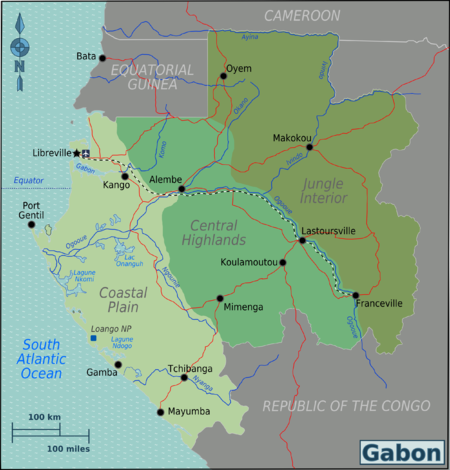
Cities [ edit ]
- 0.3901 9.4544 1 Libreville - the capital
- -1.633333 13.583333 2 Franceville
- -2.725 10.016667 3 Gamba
- -3.416667 10.65 4 Mayumba
- -0.716667 8.783333 5 Port-Gentil - on the coast of the South Atlantic Ocean
Other destinations [ edit ]
- 0.088 12.63 4 Ivindo National Park — two of Central Africa's most magnificent waterfalls; gorillas, chimpanzees, & forest elephants gather around its rivers and waterholes.
- -2.166667 9.566667 5 Loango National Park — a 100-km stretch of virgin beaches and adjacent rainforest, both scenic and a place to view leopards, elephants, gorillas, & monkeys on the beach.
- -0.525334 11.5428 6 Lopé National Park — mix of savanna & dense forest along the Ogooue River; float along the river in pirogue, view ancient rock engravings, or track gorillas or mandrill monkeys with a pygmy guide.
Understand [ edit ]
History [ edit ].
What is now Gabon has been inhabited for thousands of years, first by Pygmy hunter-gatherers and then starting perhaps as early as 1500 BC, various different Bantu tribes arrived in several waves. Portuguese explorers and traders were the first Europeans to arrive, in 1472. The nation's present name originates from "Gabão", Portuguese for "cloak", which is roughly the shape of the estuary of the Komo River close to the capital of Libreville. Soon, Europeans were trading for natural resources and slaves. In the 19th century, the French became ascendant in the area. The coast was colonized by the French in 1839, and the remainder of Gabon in 1885. Gabon gained independence on 17 August 1960.
Since independence, Gabon has been one of the more stable African countries. Autocratic President Omar Bongo was in power from 1967 until his death in 2009. Gabon introduced a multi-party system and a new constitution in the early 1990s that allowed for a more transparent electoral process and for reforms of governmental institutions. A small population, abundant natural resources, and considerable foreign support have helped make Gabon one of the more prosperous sub-Saharan African countries. Despite being made up of more than 40 ethnic groups, Gabon has escaped the strife afflicting other West African states.
Climate [ edit ]
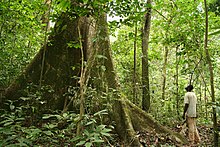
Tropical; always hot, humid. During the months of June to September, the climate is a little cooler (20-25°C).
Terrain [ edit ]
Narrow coastal plain; hilly interior; savanna in east and south. Highest point is Mont Iboundji at 1,575 metres. Gabon is crossed by the Ogooué , the country's longest river which is 1,200 kilometres long.
Important holidays [ edit ]
Independence Day : 17 August 1960 (from France)
National holiday : Founding of the Gabonese Democratic Party (PDG), 12 March (1968)
Get in [ edit ]

Visa [ edit ]
Citizens of Cameroon, Central African Republic, Republic of Congo, Chad, Equatorial Guinea, Mauritius, Morocco, South Africa, Tunisia, and the G20 countries can enter without a visa. Citizens of European Union, Australia, Argentina, Bahrain, Brazil, Canada, China(including Hong Kong and Macau), India, Indonesia, Japan, Kuwait, Mexico, Oman, Qatar, Russia, Saudi Arabia, South Korea, Turkey, United States and United Arabic Emirates can obtain visa on arrival for 90 days . All holders of an entry authorisation issued by Immigration prior to arrival can also obtain visa on arrival. The e-visa system is usable by citizens of any country which requires a visa to visit Gabon. The visa is issued 72 hours after the application and is valid only for those arriving via Leon Mba International Airport in Libreville. The fee for a visa to enter the country is typically €70-85.
By plane [ edit ]
Air France flies to Paris Charles de Gaulle Airport , other airline mostly fly to inner-African destinations.
Air France fly from Paris to Libreville , Royal Air Maroc flies from Europe via Casablanca . Turkish Airlines fly from North America, Europe and Asia via Istanbul , RwandAir fly from Europe, West Africa, East Africa and Southern Africa via Kigali , Ethiopian Airlines fly from north America, Europe, east Africa, Southern Africa via Addis Ababa . There are also flights to Brazzaville , Congo with RwandAir.
By car [ edit ]
There are several border crossings, though the roads are not good and a 4x4 is recommended.
Get around [ edit ]
The easiest way to get around outside of cities is by bus (typically 6- or 9-seater cars, but sometimes minibuses). There are many and they are very cheap (e.g., FCFA 7000 to go from Libreville to Lamberene). Within cities, taxis are plentiful and are very cheap. No fare should be more than FCFA 5000 for one person. Fares depend on distance (and whether the driver will be able to find more fares at your destination). A 2- or 3-minute drive will cost FCFA 100, and FCFA 2000 is plenty to go from Owendo train station to the centre of Libreville. Taxi prices typically double after 21:00.
Air Service has scheduled flights to Oyem, Makouko and Franceville/Mvengue. Air Nationale flies to Franceville/Mvengue. There are flights to Franceville/Mvengue every day of the week except Tuesdays and Thursdays. Africa's Connection has daily scheduled flights between Libreville and Port Gentil, weekly flights from Port-Gentil/Libreville to São Tomé & Príncipe and to Loango National Park.
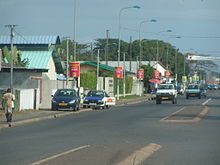
There are some paved roads in Gabon, if you are staying in one of the major cities a car should suffice. If you plan on venturing onto some of the unpaved roads outside the major cities a 4x4 is required. There are less than 800km of tarred roads in Gabon - some of them in a bad condition. During the rainy season it is difficult to travel outside the major city areas even in a 4x4 vehicle.
By train [ edit ]
The Trans-Gabon railway goes from Owendo to Franceville. The trip takes 12-18 hours, and is often delayed. Train times change according to the season. The current timetable (Basse 2014 as of March 2015) has trains both ways on Tuesday, Thursday, Friday, and Sunday. Two trains are in use - the Omnibus and the Express. Both take a similar time, but the Express stops at less small stations. Air-conditioning is present in VIP, 1st and 2nd on the Express, and only VIP and 1st on the omnibus.
By bus [ edit ]
A few wealthy Gabonese entrepreneurs have invested in new buses for bus lines to service the larger interior cities. Mostly these buses serve the cities with paved roads leading to and from them. Since Air Gabon closed down, these bus lines have greatly increased their routes.
By boat [ edit ]
Boat travel is available all along the coast of Gabon and dozens of miles up the Ogooue river to Lambarene. Boats leave daily to/from Libreville and Port Gentil. River trips from the mouth of the big river at Port Gentil to Lambarene (Albert Schweitzer Hospital) are available every few days. Hotel Olako arranges weekly boat transfers between Port Gentil and Omboué (close to Loango National Park), transfers take between 3 and 4½ hours (depending on the type of boat and engine).
Talk [ edit ]
French is the sole national language, with 80% of the population able to speak it. There are various native languages as well, the most significant is Fang , spoken by 32% of the population as their mother tongue.
There are moves to promote English in education, but it is generally not widely spoken.
See [ edit ]
- 0.40279 9.43622 1 Cathédrale Sainte Marie . Built in 1958 by Bishop Adama, it sits close to the coastline on the site of the former Fort d'Aumale. Pope John Paul II visited here in 1981. The Notre Dame Church behind the Cathedrale Sainte Marie is actually from the 19th century, but its edifice looks like it's being eaten away by saltwater or Libreville's humidity. ( updated Sep 2020 )
- 0.40705 9.45965 2 Notre Dame de Lourdes ( Our Lady of Lourdes Church ), ☏ +241 07 85 50 50 . The front facade and retable behind the altar have a hand-painted airy white and blue tapestry that is quite pacifying. ( updated Sep 2020 )
- 0.40908 9.45751 3 Church of St. Michael Nkembo ( L'Eglise St-Michel ). This church has a Pan-African type of mosaic on its pediment, and 31 wooden columns carved by Gabonese artist Zéphyrin Lendogno that depict stories from the Old and New Testament. It is quite a sight and Libreville landmark, even if you aren't the church-going type. ( updated Sep 2020 )
- 0.38412 9.44664 4 National Museum of Arts and Traditions ( Musée National des Arts, Rites et Traditions ). Tu-Sa 10:00-17:00, closed Su-M . Might be having a bit of a moment with regards to being in operation, but has an intriguing collections of sculptures and other art. Just check with the people at the chamber of commerce there if it's not appearing open. ( updated Sep 2020 )
- 0.38426 9.44622 5 Musée National du Gabon . Another museum whose status seems somewhat iffy, but it can be co-located with the Musée des Arts et Traditions du Gabon possibly. ( updated Sep 2020 )
- 0.39247 9.44205 6 Presidential Palace ( Palais Presidentiel ). The executive office of Gabonese government. Can only drive by, and no snaps with the camera either please or you'll get busted. ( updated Sep 2020 )
- 0.39694 9.43987 7 Cour Constitutionnelle du Gabon . Another Gabonese government building you'll get harangued over if you try to photograph. ( updated Sep 2020 )
- 0.40014 9.45025 8 Memorial Leon Mba . A memorial to the first president of Gabon post-independence 1960. ( updated Sep 2020 )
- Statuette debrazza de la Corniche .
- Franceville Stadium .
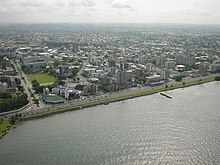
Do [ edit ]
Chez Beti - a small seaside safari camp near the village of Nyonie owned and operated by a French ex-pat. Clean, air-conditioned cottages and all-inclusive family style meals accompany the evening Landcruiser and sunrise walking safaris. Wildlife sightings can include elephants, buffalo, monkeys, parrots, hornbills and other local fauna. The camp is located just a few km south of the equator, along a pristine stretch of beach. Prices are very reasonable and include roundtrip transportation from the marina in Libreville; consisting of an hour long boat transit to a small landing in the mangroves, followed by a 45 minute 4x4 trip along jungle roads to the camp. Contact information: tel. 07 57 14 23 or 06 03 36 36, e-mail: [email protected]
Buy [ edit ]
Money [ edit ].
The currency of the country is the Central African CFA franc , denoted FCFA (ISO currency code: XAF ). It's also used by five other Central African countries. It is interchangeable at par with the West African CFA franc (XOF), which is used by six countries. Both currencies are fixed at a rate of 1 euro = 655.957 CFA francs.
ATMs [ edit ]
All Ecobank ATMs in Gabon take Mastercard and Visa card for cash withdrawal.
Eat [ edit ]
The Balbool restaurant serves delicious western food with very cheap prices. Ask for the big Balbool soup.
Drink [ edit ]

The cheapest local beer is Regab, it costs FCFA 500-2000 and comes in a 650 mL bottle.
There are fantastic fruit juices available: "D'jino" Pampelmousse (grapefruit), Ananas (pineapple), Citron (Lemon) in 300 mL bottles at FCFA 400 and in a 1.5 L bottle at FCFA 900 if bought in a shop.
Sleep [ edit ]
There is just one main international hotelier in operation in the country - Radisson in the form of Radisson Blu and Park Inn Radisson in Libreville. Apart from this, there are budget and economy hotels in the various municipalities of Gabon.
Long-term lease on apartments is also an option.
Work [ edit ]
A visa and letter of invitation are required for foreigners working in Gabon.
Stay safe [ edit ]
Gabon is a somewhat safe country compared to its neighbors, but don't let that fool you as pickpockets and other types of crimes targeting tourists are still common and you should practice common sense. Libreville and Port-Gentil are generally safer than the other areas of Gabon.
Gabon has been politically unstable since the coup, and its advised to avoid any gathering as it may turn violent. Police may also confiscate your passport and interrogate you on why you came to Gabon.
Stay healthy [ edit ]
Malaria is common, so visitors should take malaria pills and a mosquito net when travelling in Gabon.
HIV/AIDS is a common disease in Gabon with 8% (1 in 12) of adults infected.
Don't drink the tap water .
Respect [ edit ]
The people are generally very friendly, respectful and helpful to visitors.
Connect [ edit ]
Go next [ edit ].
- Has custom banner
- Has warning box
- Has map markers
- Outline countries
- Outline articles
- Country articles
- Has Geo parameter
- Central Africa
- All destination articles
- Pages with maps
Navigation menu
Stanley facilitates transformative coaching conversations to help professionals and businesses to gain clarity, overcome challenges and achieve set goals. He has 7 years of coaching experience.
Stanley is the lead trainer for ICF accredited coaching course that he co-developed, mentor coach and assessor. He is an instructor for VMware, Google Cloud, EC Council, Juniper Networks, Symantec, CompTIA and CommVault. He has 18 years of training experience.
Stanley is passionate about speaking on Unlocking Human Potentials with Transformative Power of Coaching. He is also an OnStage Sales Closer and Motivational Speaker. He has 12 years of public speaking experience.

Stanley Has Personally Worked With...

Transformative Power of Coaching
Client Testimonials

Always Natural

Royal Caribbean
Where Extraordinary Happens

Heart of Asia

Passion Made Possible

Be Enchanted

New Zealand

Amazing Thailand

Beautiful China

Dream Big Live Slow

Come and Say G'day

Endless Discovery

Timeless Charm

Every Day is A Wonder

Wonderful Indonesia

Switzerland
Get Natural

Imagine Your Korea

Simply Inspiring
Let's Connect! Click Social Icons or Online Form
Over 500,000+ Lives Impacted Across Stanley's Social Media Networks
For professional connections, knowledge sharing, and growth.
For expressing opinions, share info and engage in discussions.
For sharing transformative coaching demonstrations with real clients.
For connecting with newly met people and sharing personal updates.
For creative expression, showcasing lifestyle, hobbies, and experiences.
For creating and sharing short videos for inspiration and motivation.

Online Form
Kindly fill out the form to get in touch with me for inquiries.
This country has so many beautiful places waiting to be discovered by adventurers and nature-lovers. In fact, little-visited Gabon has everything to become Africa’s next big ecotourism destination. Sean Connolly , author of Gabon: The Bradt Travel Guide
Famously dubbed ‘Africa’s last Eden’ – and, even more enticingly, ‘the land of the surfing hippos’ – Gabon is one of the world’s most pristine ecotourism destinations. Much of the country is swathed in dense rainforest populated by chimpanzees and mandrill troops, while the remainder is grassy savannah, vast island-dotted lagoons and miles of white-sand beaches where gorillas and elephants can be seen strolling alongside the surf.
Gabon’s national parks protect over 12% of the country and offer visitors a trip into Africa at its purest, where you can still enjoy wildlife and breathtaking natural beauty while having the place to yourself. Loango National Park has become synonymous with wildlife promenading on the beach, while outdoor enthusiasts can explore Ivindo National Park by taking a pirogue through the rainforest to the spectacular Koungou Falls. Birders are drawn to Akanda or Lopé National Park and whale watchers should head to Pongara.
In fact, little-visited Gabon has so many beautiful places waiting to be discovered by adventurers and nature-lovers that one might almost forget that the country also offers a fascinating tradition of pre-animist culture, as well as some interesting remains from colonial times. The secret society Bwiti, whose initiates eat the hallucinogenic shrub of the iboga to facilitate contact with their ancestors and deepen their understanding of life, has always lured – and sometimes frightened – curious visitors. Another highlight is Albert Schweitzer’s famous colonial hospital in the small town of Lambaréné, which is still functioning today.
Gabon is investing heavily in unlocking its touristic potential and the country aims to attract 100,000 visitors. It won’t be long before these tourists arrive – so now is the perfect time to go.
Food and drink in Gabon
It is possible to eat very well in Libreville and Port-Gentil if you can afford the international prices. Some of the world’s most popular cuisines are readily available, notably Italian, Chinese and, of course, French. There are French-style boulangeries selling all manner of croissants and pastries, and the supermarkets are stocked with cheeses, wines and even meat and vegetables imported from France. The choice is supplemented by goods imported from Cameroon, Equatorial Guinea and South Africa.
In Libreville, Port-Gentil and other places where there are tourist restaurants and hotels, it is usual to find both European and African dishes on menus, and often tasty grillades (barbecued fish or meat) as well. In smaller towns and out-of-the-way places there may be a handful of small African restaurants or maquis . These tend to be Senegalese or Cameroonian, and the best serve generous portions of good food for not very much money.
The quickest and cheapest sources of prepared food, however, are les bédoumeuses . These are the women selling doughnuts, small brochettes of meat and filled baguettes on the street. Amazingly, fresh baguettes are sold every morning in just about every market in the country, no matter how remote. French baguettes are one of the Gabonese staples, alongside smoked or salted fish, manioc, plantain and rice.
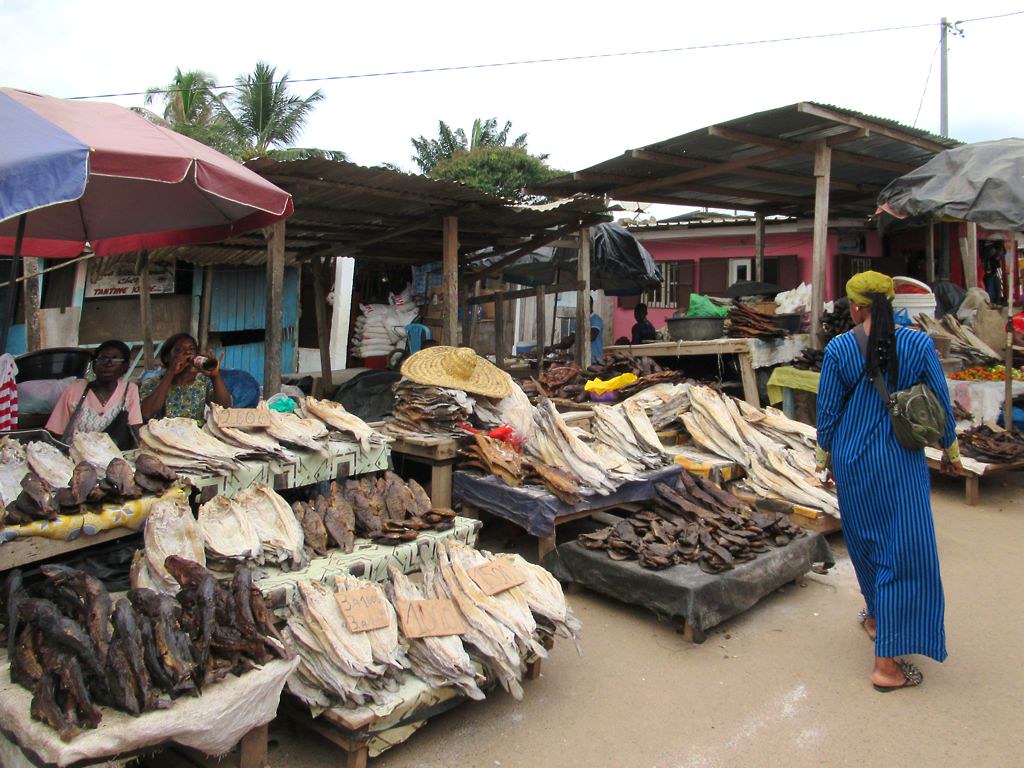
Fish-lovers will be in heaven in Gabon as fresh fish is available all over the country, from upmarket restaurants to local maquis . Gabonese-style crabes farcis (stuffed crabs; made from shredded crab meat cooked with onion, garlic, chilli, lemon juice, parsley and other spices then baked in the shell) are a must-try.
No meal is complete without piment , a very hot sauce made of peppers and herbs. Othr typical sauces are prepared with arachides (peanuts), nyembwe (the pulp of palm nuts) or odika (an oil-producing seed also known as chocolat ). Chocolat in fact consists of crushed, fermented odika seeds. This paste of crushed seeds is stuffed into plastic bottles used as moulds, and dried until the chocolat is solid. Readymade chocolat can be found in the big supermarkets in Libreville.
Drinking is an extremely popular pastime and, particularly in rural areas, it’s quite often easier to find a bar than something to eat. The local beer Régab, a light lager sold in 65cl bottles, is good value. Its brewery, the Société de Brasseries du Gabon (Sobraga, owned by the French Groupe Castel), is one of the country’s biggest employers. Sobraga also brews Guinness, 33 Export, Castel and Beaufort under licence. Count on paying 600CFA for a Régab in the local wooden shack, rising to 1,000CFA in a mid-range bar or restaurant, and over 1,500CFA in an upmarket hotel or restaurant.
In rural areas, the ubiquitous palm wine is the usual tipple. It’s extremely cheap and easy to produce by extracting the sap from a wine palm and leaving it to ferment over the course of a day. The wine produced is sweet in the morning, but starts to pack a punch by nightfall.
To be on the safe side, it is better not to drink the tap water in Gabon unless you have water-purifying tablets. Bottled water is widely available, as are beers, wines and spirits, and soft drinks (often simply – and somewhat confusingly – referred to as jus ) like Coca-Cola, Sprite, Fanta, and local brand D’jino.
Health and safety in Gabon
Gabon’s medical facilities are relatively good. Most hospitals are public, but in the main cities (Libreville, Port-Gentil and Franceville) there are some good private clinics. The best known is without doubt Lambaréné’s Albert Schweitzer Hospital, but better equipped to deal with emergencies are Port-Gentil’s Clinique Mandji or Libreville’s Polyclinique El-Rapha Clinique. Be aware that few doctors speak English. If you are not confident of your language level, you might want to enlist the help of someone to act as your translator. Note that consultation fees and laboratory tests are comparable to those in most Western countries. The US Embassy maintains a list of doctors here .
Pharmacies are omnipresent in larger cities and towns and commonly required medicines such as broad-spectrum antibiotics are widely available throughout the region, as are malaria cures and prophylactics. If you are on any medication prior to departure, or you have specific needs relating to a known medical condition (for instance if you are allergic to bee stings or prone to attacks of asthma), then you are strongly advised to bring any related drugs and devices with you. Sadly, there is a problem with counterfeiting drugs in Africa, Gabon included, so while pharmacists will be selling medicines in good faith, you would be wise to carry anything that you know you will need with you.
Sensible preparation will go a long way to ensuring your trip goes smoothly. Particularly for first-time visitors to Africa, this includes a visit to a travel clinic to discuss matters such as vaccinations and malaria prevention. All advice found online should be used in conjunction with expert advice received prior to or during travel.
Although Gabon is, by and large, a safe country in which few travellers experience any problems, it doesn’t hurt to remain cautious and be prepared for potential dangers. Contrary to what you might expect, tropical disease, most notably malaria, poses the biggest safety threat at any time of year.
Serious crime, such as muggings and hold-ups, are comparatively rare, but travellers should guard against petty crime. As is the case anywhere in the world, pickpocketing and bag snatching can be a problem in busy areas like markets, buses and train stations. It’s also worth being cautious in poorer areas and on isolated beaches, particularly around Libreville, and avoid walking on any beach at night. If you’re headed to any of these places, it’s best to take a few sensible precautions: keeping valuables safely stashed or – better yet – not bringing them at all. For the essentials you are carrying, simply work to make them less accessible – think money belt and front (buttoned) pockets.
Carry your passport with you at all times, particularly when travelling. Random controls are a feature of life in Gabon and foreigners can be a lucrative target. You may even hear some unpleasant stories of nights spent in jails for those without papers. These may not be usual (or may not even be true), but it’s simply not worth the risk.
Female travellers
Travelling alone in Gabon does not pose any particular security problems for women; although, as anywhere in the world, there are always drageurs (scoundrels) on the prowl.
Generally speaking, Gabonese men may try to flirt, but usually a (fictitious) boyfriend or husband does the trick in losing their attention. And the extra attention you may receive will tend to be more annoying than dangerous. It’s worth noting that in Gabon, revealing dress will increase the amount of this type of attention you receive.
LGBTQ+ travellers
In December 2008, Gabon co-sponsored and signed the nonbinding UN declaration on sexual orientation and gender identity, calling for the global decriminalisation of homosexuality – one of only six African countries to do so. Homosexuality is not explicitly illegal (in contrast to most African countries) but is definitely frowned upon. Discrimination is a problem and many people turn away from gay individuals who are open about their sexual identity. Predictably, you won’t find a vibrant gay scene here.
Travelling with a disability
Gabon has no infrastructure that suits visitors with disabilities. There are no laws for providing access to transportation, buildings or services, and few buildings in the main cities have disabled access. Only the more luxurious buildings have lifts. Staff at hotels are generally not used to taking care of visitors with specific needs, and disability awareness still has some way to go.
Travel and visas in Gabon
Needless to say, you must ensure you have a valid passport, and one that is not due to expire for at least six months. An International Certificate of Vaccination against yellow fever is also necessary for entry into Gabon and is the first thing to be checked upon arrival.
Visas are required for all travellers. If flying into Gabon, you will either need to apply for a visa at a Gabonese embassy before departure or take advantage of the e-visa system (only available for travellers arriving by air to Libreville): both one-to-three-month single-entry (€70 plus €15 processing) and six-month multiple-entry (€185 plus €15 processing) visas can now be applied for online . After filling out the form and uploading the required documentation (passport and colour photo), you will receive an application receipt ( reçu d’inscription ) which, assuming your paperwork is in order, should be followed by a travel authorisation ( autorisation d’entrée ) within 72 hours. Print this and bring it to the airport, where you will receive the visa sticker and pay in euros (cash only) on arrival.
Once in Gabon, visa extensions (usually up to three months) can be arranged at the Direction Générale de la Documentation et de l’Immigration (Directorate General of Documentation and Immigration; DGDI; often known by its former acronym CEDOC – after Centre de la documentation; Zone Industrielle d’Oloumi, Libreville), but in the first instance it might be advisable to talk to a travel agent.
Getting there and away
For all intents and purposes, Gabon has only one international airport, Léon Mba International Airport in Libreville. Port-Gentil’s airport can technically handle international flights, but at the time of writing this was limited to a twice-weekly connection to Pointe-Noire in the Republic of the Congo with Equaflight. There are also international connections between Franceville and Brazzaville, also in the Republic of the Congo, on a similar schedule with Afrijet.
To fly direct to Libreville from Europe, your options are basically Air France from Paris, or Turkish Airlines from Istanbul. The direct flight time from Paris is about 7 hours. Other easy connections include flying with Ethiopian Airlines via Addis Ababa, Royal Air Maroc via Casablanca, or Rwandair via Kigali. Flights are not known for being especially cheap, but it’s often possible to fly from Europe for under €700 return, depending on the city of departure.
There are no direct connections from North America, so you’ll have to transfer in via one of the above-mentioned cities.
There are regular flights to Libreville from other African countries, including Benin , Cameroon, Congo (Republic and Democratic Republic), Ivory Coast , Equatorial Guinea , Ethiopia , Kenya, Nigeria, Rwanda , Togo, and São Tomé and Príncipe .
If you plan to enter Gabon overland you’ll firstly need to acquire a visa in either a neighbouring country or your home country as, at the time of writing, visas weren’t available at land borders. The most popular route for overlanders involves entering Gabon from the north and crossing the Ntem River, which forms a natural border with Cameroon. There are two crossings in the northwest corner of Woleu-Ntem province, with the most popular being at the north end of the N2 between Eboro (Gabon) and Abang-Minko (Cameroon). Alternatively, there is a lesser-used but still reasonably busy crossing between Meyo-Kye (Gabon) and Kye-Ossi (Cameroon). Both crossings are 25–30km away from Bitam, which is reachable on surfaced roads.
Your passport, visa and hotel booking will be examined at the border checkpoint, but you must formalise your stay with a passport stamp from immigration in Bitam. (If you’re leaving Gabon via this route, don’t forget to get your exit stamp from the same immigration office.) Border formalities in Cameroon are carried out in Ambam. There is also a remote and little-used crossing 20km north of Minvoul between Nsak (Gabon) and Aboulou (Cameroon).
There are a few boats that regularly take passengers between Port Môle in Libreville and other regional ports. Société Hawa runs large passenger boats to Douala (Cameroon), Calabar (Nigeria), Cotonou (Benin) and Lomé (Togo). Schedules change, so call or visit their bureau at Port Môle for upcoming departures.
Otherwise, freight boats bound for Libreville will sometimes take paying passengers. These usually leave from Bata (Equatorial Guinea), Abidjan (Ivory Coast), São Tomé and, most frequently of all, Douala (Cameroon). Crossings are irregular and you would need to make enquiries at the boats docked at the ports and negotiate with the captain. Prepare for a rough ride and take more food and drink than you think you will need.
Your only other option for getting to Gabon by water is with a pirogue (5,000CFA) from Cogo in Equatorial Guinea, which sits 15km up the Muni River from Cocobeach in Gabon.
Getting around
Getting from place to place in Gabon can be difficult, time-consuming and expensive; more often than not, it’s all three. Despite this, it can also be a fantastic way to see the country and meet its people.
Flight schedules change frequently and with little notice and airlines should be contacted directly for the most up-to-date information. They usually have offices in town as well as in the airports. Flying around Gabon isn’t cheap. Depending on the distance and the airline, a one-way trip can cost 70,000–150,000CFA and a return flight will be double that.
At the time of writing, there were three airline companies serving the interior, of which Afrijet is by far the most reliable.
If you have the funds, hiring your own light aircraft will give you even greater flexibility. It’s expensive, but the views are amazing – that is, unless weather conditions force the pilot to fly above the clouds. Seeing the rainforest from 10 to 100m above is much more than a means of getting to your destination, it is an attraction in itself. Make enquiries with Afrijet or a tour operator.
Gabon’s only railway, the Transgabonais (Trans-Gabon Railway), bisects the country east–west, running from Libreville through over 20 stations to its terminus, Franceville. It plays a crucial role in the country’s economy and in linking the capital to rural areas. The railroad is administered by the Société d’Exploitation du Transgabonais (SETRAG).
SETRAG runs two types of train. The Train Omnibus l’Equateur links all 21 stations between Libreville and Franceville; the Train Express Trans-Ogooué stops only in Ndjolé, Lopé , Booué, Ivindo , Lastoursville and Moanda. The cheaper (and slower) Omnibus leaves Libreville on Tuesdays, Thursdays and Sundays, and the faster (and more expensive) Express departs on Mondays, Wednesdays and Fridays. According to the timetable, all trains depart at 18.50 and the fast train gets you to Franceville in 12½ hours, while the Omnibus needs 1 hour more. In reality, delays are chronic and a delayed departure followed by a 14–16-hour journey time on either train is more likely.
Despite remaining challenges, Gabon’s infrastructure sector has seen large improvements since President Ali Bongo took over. When he came to power, only 10% of Gabon’s 9,000km of roads were tarred and only 20% of the untarred roads were considered ‘good’. Although the government missed their stated objective of tarring 3,600km of road by 2016, Ali Bongo’s ten-year administration has seen more roads surfaced than the entirety of his father’s 41-year tenure.
Major renovation of the road between Libreville and Ntoum, currently a main bottleneck for all incoming and outgoing traffic, was underway at the time this guide went to print, and the first stage of the road between Libreville and Port- Gentil (between Port-Gentil and Omboué) will be officially inaugurated at the end of 2019.
No matter how you get around on Gabon’s roads, checkpoints and roadblocks are a fact of life here and will inevitably slow you down. It’s not uncommon for officials to try and catch you on a mistake (or simply invent one) in order to attempt to solicit a bribe, so make sure your paperwork is in order and always carry your passport. To avoid unnecessary hassle, also carry your international immunisation record (yellow booklet).
Pirogues, or dugout canoes, are the traditional method of transport wherever there is water. Increasingly, pirogues are now motorised. A man who directs a pirogue is called a piroguier , or a pagayeur , after the pagaye or pole used in traditional pirogues. Ferries run between Libreville and Port-Gentil and between Port-Gentil and Lambaréné.
When to visit Gabon
Like all equatorial regions, Gabon’s is a tropical climate. It’s hot and humid all year-round, averaging 26°C and 85% humidity, with a typical annual rainfall of 2.51m. The climate does of course vary slightly depending on where you are. Thanks to the trade winds, the humidity on the coast is less intense, and there is less rain the further south you head. Broadly speaking, Gabon has two main seasons: a long rainy season between February and May, followed by a long dry season from late May to mid-September. The rest of the year is made up of two shorter seasons: a rainy season from late September to November (the month with the highest average rainfall) and a dry season from December to January.
What to see and do in Gabon
Fernan vaz lagoon.
A trip to the Fernan Vaz Lagoon is one of the highlights of any exploration of the Ogooué-Maritime region and, with the opening of a new road from Port-Gentil, it is more accessible than ever. The setting is delightfully dramatic, with the lagoon’s dark waters ringed by an impossibly green and vegetated shore.
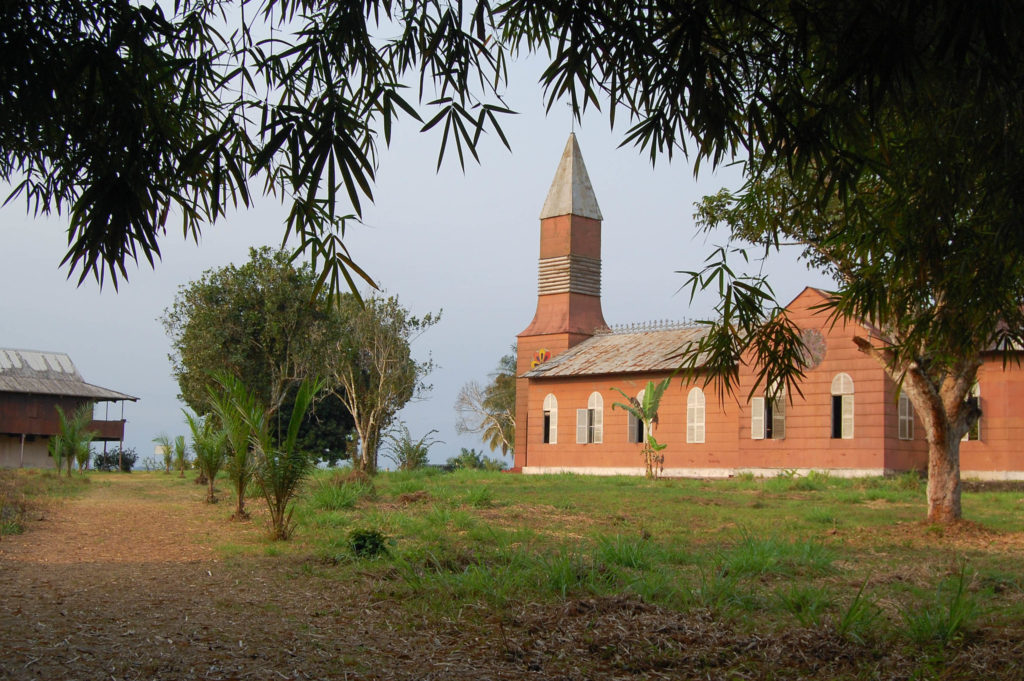
The lagoon takes its name from the Portuguese sailor Fernão Vaz, who discovered it at the end of the 15th century, but its most famous landmark, the Mission Sainte-Anne and its rust-red église , dates from four centuries later. The church was built in 1889, the same year as the Eiffel Tower, and, unlikely as it may seem, there’s actually a connection. Look no further than Gustav Eiffel himself, who shipped the plans and materials all the way from Paris at the behest of Mrs Bichet, the mother of Sainte-Anne’s founding priest and a wealthy woman with Paris connections. The church stands tall and elegant, the metal worn to a deep, rusty red over the years.
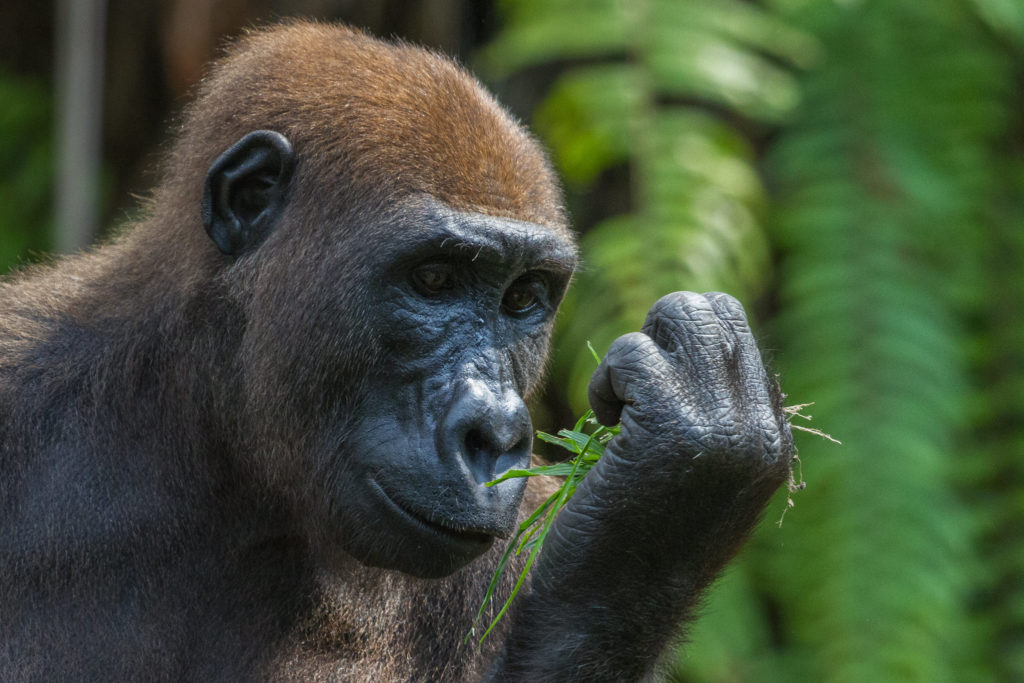
Today, the lagoon is also home to the commendable Fernan-Vaz Gorilla Project, which has been caring for orphaned gorillas since 2001. Situated on Île Evengué-Ezango (popularly known as Île aux Gorilles), the project runs a sanctuary and reintroduction centre. The four gorillas in the sanctuary, a forested enclosure on the island, act as conservation ambassadors to help educate national and international visitors on the plight of great apes. The rehabilitation centre is located on nearby Île Oriquet, away from human exposure, where eight orphaned gorillas currently reside. The aim is to reintroduce them back into the wild. The PGFA base camp is located at Mpando (on the mainland,) just 600m across from Oriquet Island. Visits generally last about 90 minutes, including a short introduction to the centre.
Ivindo National Park
Traversed in the north by the black waters of the Ivindo River – the Ogooué’s largest tributary – and by the little-explored Djidji (Dilo) and Langoué rivers to the south, the 300,000ha of Ivindo National Park are among Gabon’s wildest and most spectacular. Southwest of Makokou, the Ivindo’s strikingly dark, tannic waters widen and break up into a labyrinth of channels and rapids flowing around hundreds of rocky islets, culminating in the phenomenal display of the Chutes de Koungou: a complex of waterfalls nearly 2km wide, broken up into four levels and three separate sets of cascades. These impressive falls, with a drop of over 50m, are the highest in equatorial Africa and of great spiritual value to local people. Intensely vegetated islands dot the river here, with some as small as individual trees that seem to grow directly out of the falls.
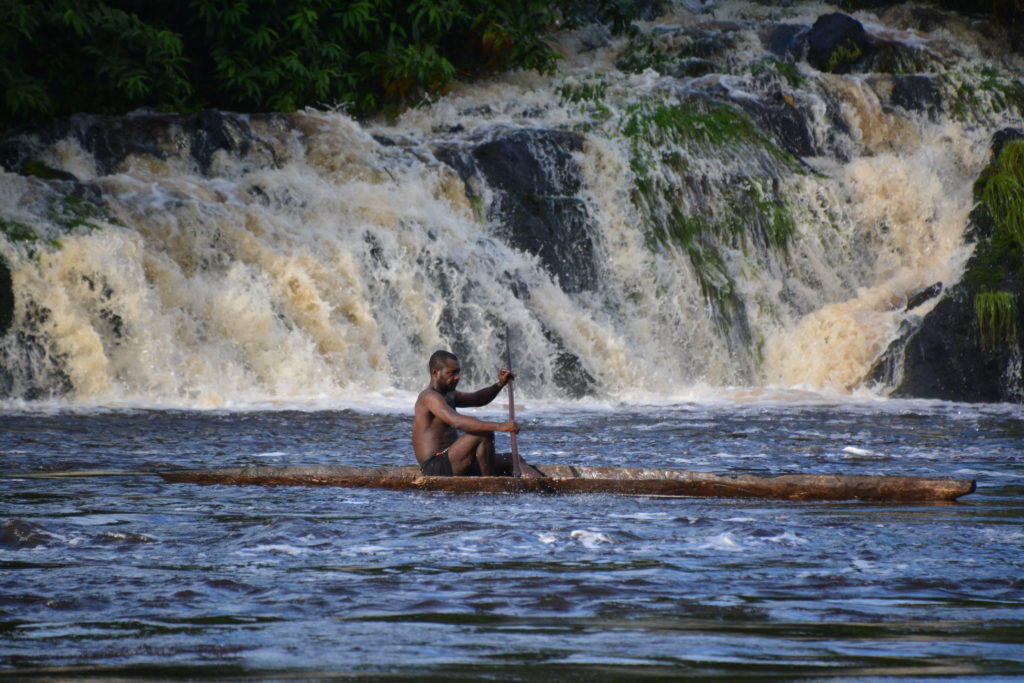
A pirogue trip through the forest to the Koungou Falls provides an exhilarating introduction to the wilderness, with plenty of opportunities to glimpse birds, monkeys and hippos. More than 430 species of bird, including large concentrations of African grey parrots, are recorded as living in the Ivindo Basin, making it one of the most rewarding bird-spotting regions in Africa. Underwater, the Ivindo’s ichthyological fauna changes significantly above and below the falls, as most fish are unable to cross the natural barrier formed by the rapids.
Léconi Canyons
The small town of Léconi (population 7,300) sits just east of its namesake Léconi River (home to a good spot for swimming) and is a convenient base from which to visit the Léconi Canyons (eroded sand escarpments) and Léconi Park. There are three named canyons in the area, that are individually named after their colours (red, white and green).
By far the most visited of the three, the Canyon Rouge (also known as Canyon Rose or the Cirque de Lékoni) is fortunately said to be the prettiest of the three. It sits less than 10km southeast of Léconi town, though the last 5km are on a sandy track, so a 4×4 is required. It may be useful to have a guide in the rainy season (just ask at your hotel). The track emerges at the lip of a cliff without warning (so drive carefully), and you’ll find yourself looking down into twin canyons – the larger ‘male’ canyon and the smaller ‘female’ one behind. There is a trail along the edge of the male canyon, leading to the female one. According to local belief, the canyons are home to spirits and those who enter will never return. More prosaically, don’t leave valuables unattended in your vehicle, as they may be gone if and when you return. The lake beyond is the Lac aux Caïmans, which was once home to a large population of crocodile, though hunters have ensured that there are very few here anymore.
Gabon’s capital lies in the far northwest of the country, splayed haphazardly along the shores of the Atlantic Ocean for close to 30km. Libreville – or Elbévé, as the locals call their home town (just pronounce L-B-V in French) – is a beguiling hodgepodge of a city: a grab-bag mix of gleaming, vainglorious government buildings, modern tower blocks turned black with tropical mould, and singlestorey shops and tin-roofed shacks of the style found across the African continent. While the architecture may seem incoherent, the welcome is well established – Libreville is a laid-back capital city and the Librevilleois who call it home are warm, genuine, and inevitably intrigued to hear that you’ve come to their town as a tourist.
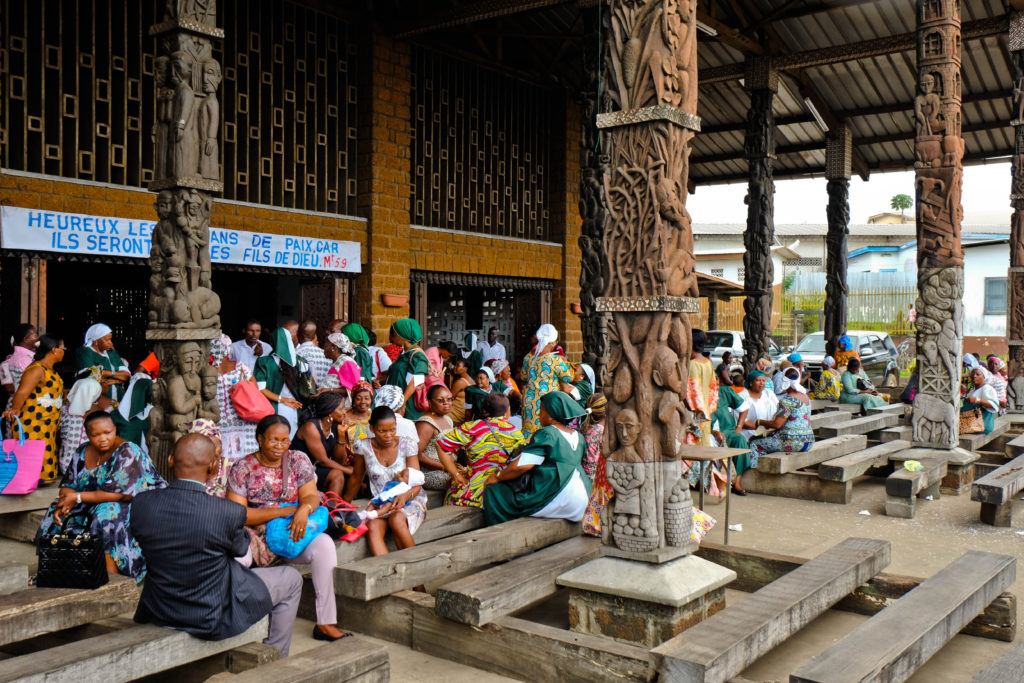
Arriving by air in the daytime offers a fantastic view over the riotous greenery and labyrinthine creeks of Akanda National Park to the north, and by night you see the city’s isolated glow – surrounded by the Atlantic’s inky blackness to the west and Gabon’s famous forests to the east. You can sometimes even spot the eerie fires of oil platforms burning off excess natural gas offshore. The runway is no more than 500m from the palm-studded shore, and the tropical humidity will have you in its pillowy grasp before you’re down the boarding stairs. From here, the city is your oyster, and Libreville has a little something for everyone, whether you’re after glittering nightclubs and fine gastronomy or traditional art and secretive ceremony.
Loango National Park
Loango National Park is the jewel in the crown of Gabon’s 13 parks and offers one of the world’s most exhilarating safari experiences, thanks to its irresistible combination of scenery and wildlife. With more than 175km of uninhabited shoreline, it is widely regarded as one of Africa’s last great coastal wildernesses. Lagoons, forests, savannahs and wetlands all come together within the park’s 1,500km 2 .
Loango’s endless beach is one of the few places in the world where buffalo and forest elephant still have access to the sea, and even gorilla families are occasionally seen foraging in beachside trees. The park is also home to the legendary ‘surfing hippos’, memorably captured on film by National Geographic photographer Michael Nichols in 2004. In season, humpbacks and dolphins may be seen frolicking in the warm equatorial waters of the Atlantic Ocean just offshore. Many rare bird species have also been spotted here, including Forbes’s plover, Loan go weaver, quail finch, rosy bee-eaters and Congo River martins. The park is a paradise for lovers of sport fishing and record catches of tarpon, as well as barracuda, rouge, and big sharks are possible here.
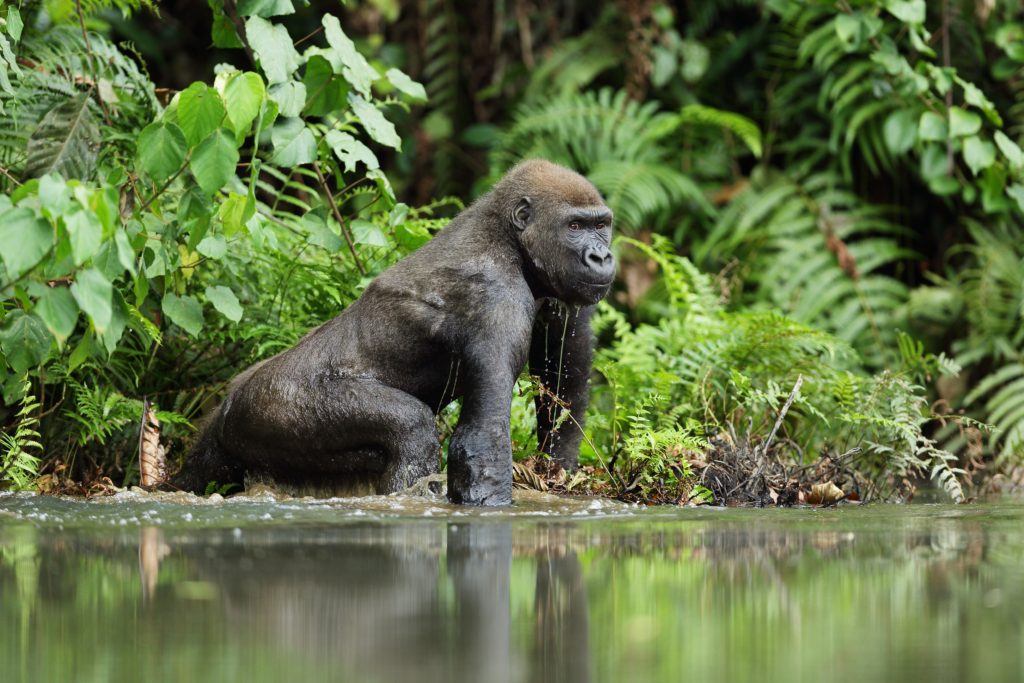
Loango’s attractions change depending on the time of year but, regardless of season, the park is worth at least two or three days of your time, should your budget allow. The whale season begins around mid-July and continues through to mid-September, the tarpon fishing season lasts from October to mid-November, and the turtle season is October to mid-January. For the best chance of seeing elephant wandering the white-sand beaches, visit during the rainy season from October to April. At all times, you’re likely to see at least some of the following: buffalo, hippo, crocodile, manatee, elephant, chimpanzee and gorilla.
Lopé National Park
Lopé National Park is a vast expanse totalling 485,000ha. Bordered by the majestic Ogooué to the north, the Offoué to the east, the du Chaillu Mountains in the south and the Mingoué River to the west, more than 1,500 plant species have been recorded here, of which 40 represent new species for Gabon.
Lopé is also home to 412 of the 700 species of birds recorded in the country, including seven kinds of hornbill, three forest kingfishers and the vulnerable grey-necked picathartes.
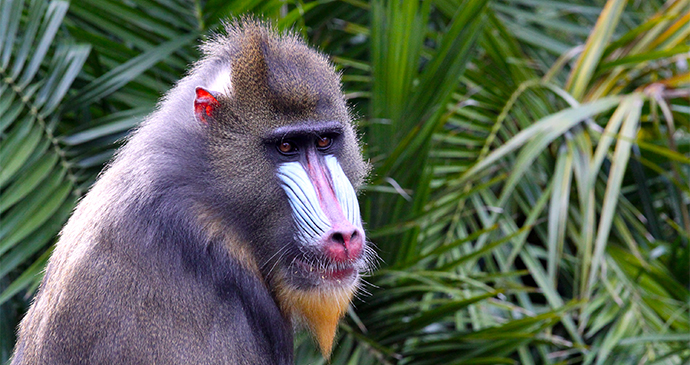
The largest known wild primate gathering – 1,350 mandrills in one great foraging group – was recorded here in 1996. Mandrills are particularly visible in the dry season (July–August), when they hang around in the north of the reserve for up to two weeks at a time. No-one knows why they gather in such large groups. Besides mandrill, there are large gorilla and chimpanzee populations.
The first thing to strike you as you arrive at Lopé is the dramatic patchwork landscape of open savannah and dense rainforest. The explanation for this landscape lies in the last ice cap in northern Europe, 18,000 years ago, when the cooler, drier climate caused great stretches of tropical rainforest to disappear.
Moukalaba-Doudou National Park
Gabon’s third largest national park, the 503,000ha Moukalaba-Doudou is a rugged area with a diverse range of habitats, from tropical rainforest and grassy savannahs to papyrus swamps. Running between the Moukalaba River to the east and the Ndogo Lagoon to the west, the park also covers the Doudou Mountains. This is the largest mountain range in southwestern Gabon, reaching an altitude of approximately 700m. While the Doudou Mountains were logged from the 1960s until the 1980s, the area is now completely uninhabited.
With an estimated population of almost 5,000 chimpanzees and gorillas, Moukalaba-Doudou has some of the highest densities of primates in Gabon, making it one of the country’s most promising gorilla-tourism sites. The best time of the year to see primates is during the dry season, between June and September. Gorilla trekking visits are possible and, while accessing the park is not exactly easy, they are well worth the effort.
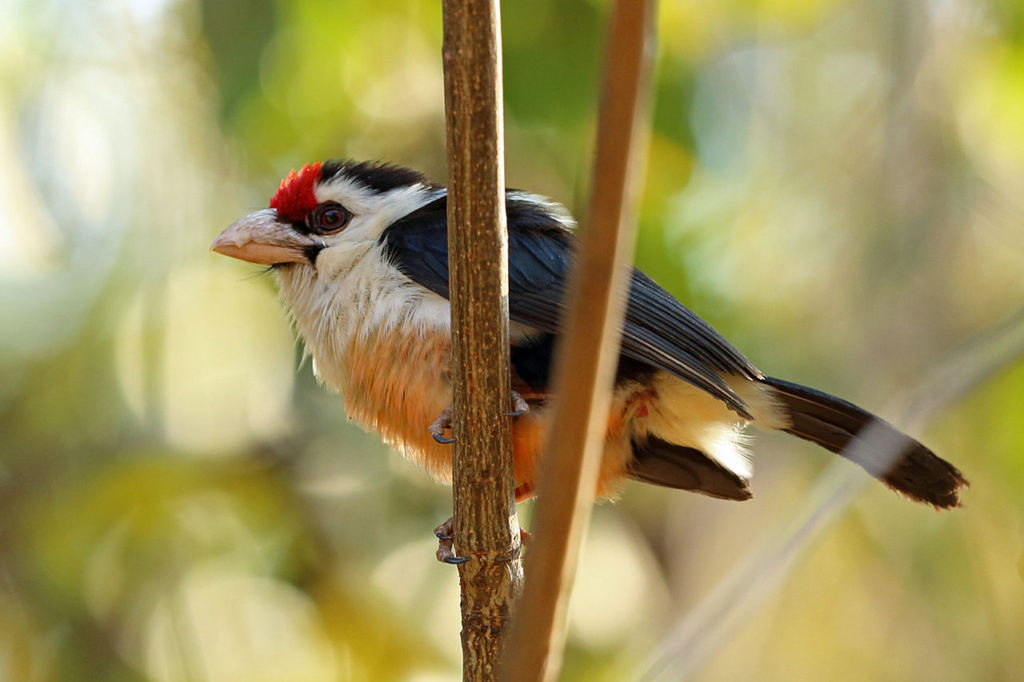
Former logging sites are now abundant with succulent marantaceae plants, a major food source for gorilla as well as forest elephant and other species. Furthermore, the savannahs near Doussala are the only place in Gabon where herds of common cobe (waterbuck) are found. The park is also a remarkable area for birders; more than 380 species (many of them unique) have been spotted here, including the vermiculated fishing owl, black-backed barbet, black-headed batis, fiery-breasted bush-shrike, brown twinspot and some rare swallows.
Pongara National Park
One of Gabon’s most accessible parks, Pongara National Park is astonishingly beautiful. Extending for 870km 2 over much of the Pointe Denis peninsula and the riverine landscapes of the southern Gabon Estuary, it was granted protected status because of its diverse scenery – vast mangrove flats, forest, savannah, and of course the beach itself. It harbours a rich and varied birdlife, including vulnerable Damara terns. The beach at Pointe Pongara, where the estuary meets the ocean, is famous for the large number of vulnerable leatherback turtles that crawl ashore to lay their eggs. Pongara’s mangroves are full of shrimp and young saltwater fish. Its forests have remnant populations of monkey, buffalo, duiker and even a few chimpanzee and elephant.
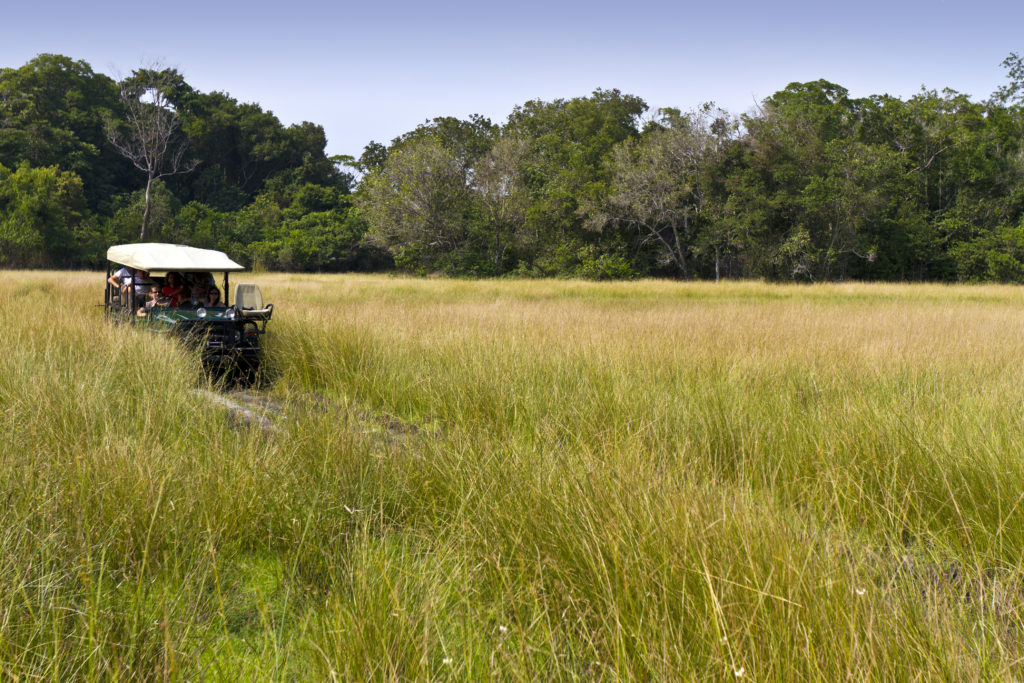
Most visits to Pongara National Park take in only the peninsula portion that surrounds Pointe Denis, as there is currently no tourist development in the riverine southern part of the park. Aventures Sans Frontières organises wonderful excursions to the peninsula. As turtles tend to lay their eggs at night, the company offers to pitch a tent for you right on the beach. You can spend the day walking along the coast on the lookout for turtle traces, or join a guided forest tour. All excursions start at ASF’s Pongara Eco-museum (located near Pointe Pongara), which provides information about turtle biology, threats and conservation issues, and displays several shells and turtle models, giving you an idea of these creatures’ grand scale. The trip is excellent value for money.
Related books
For more information, see our guide to Gabon :
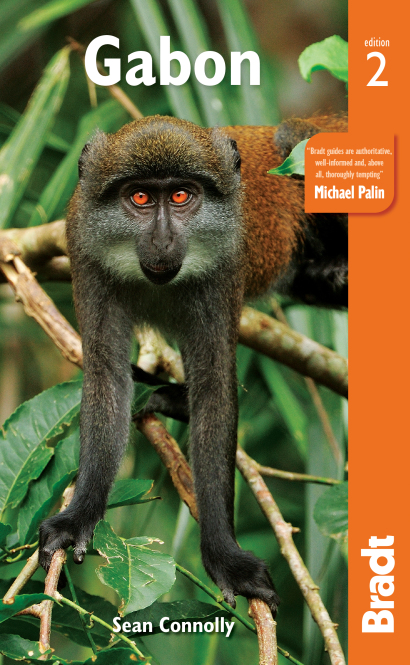
Related articles
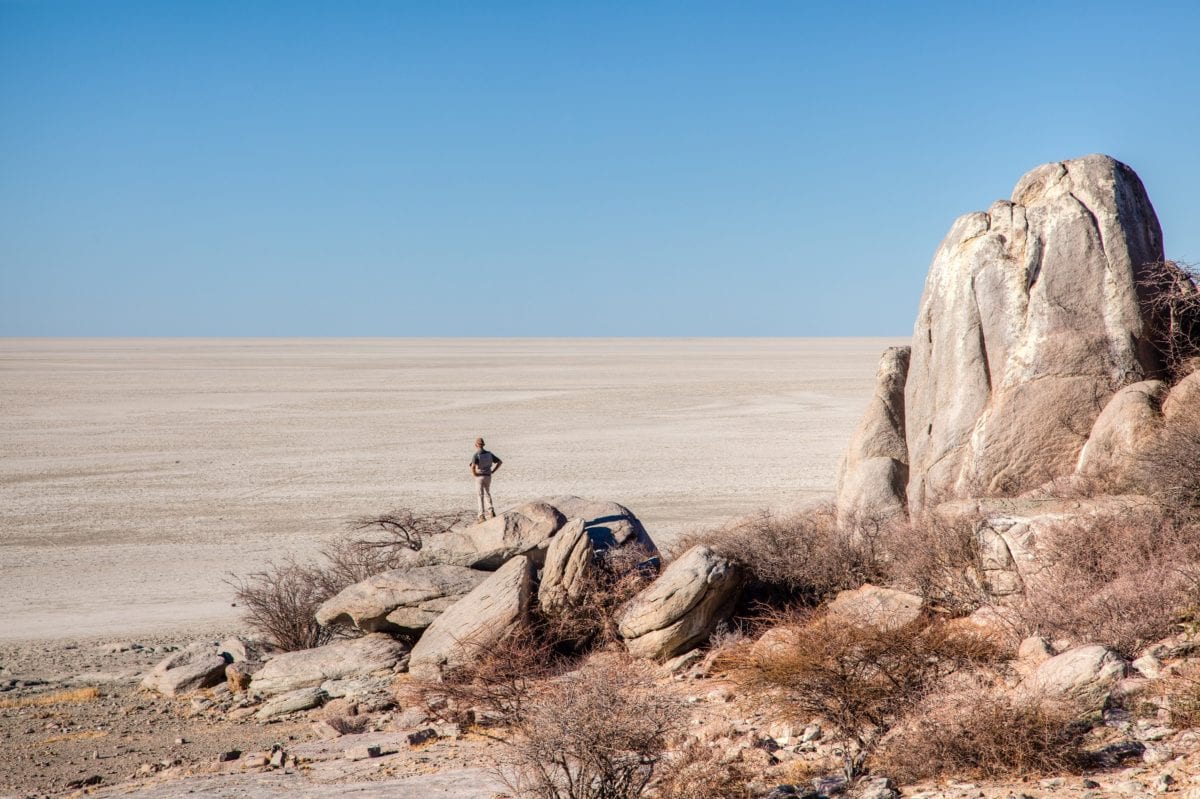
The world’s most impressive geological features
Marble caves, salt lakes and rainbow mountains.
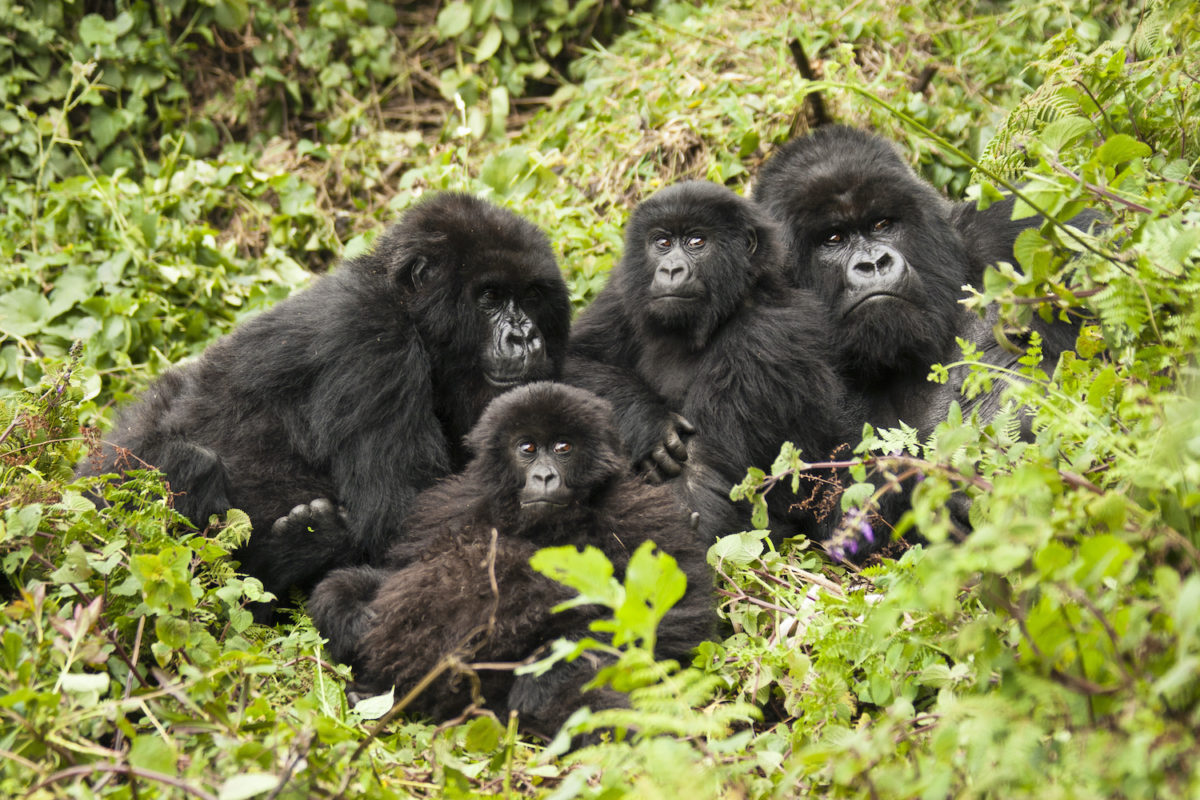
Nature’s gentle giants: a comprehensive guide to gorilla tracking
For many, gorilla tracking is a spine-tingling wildlife experience without peer.
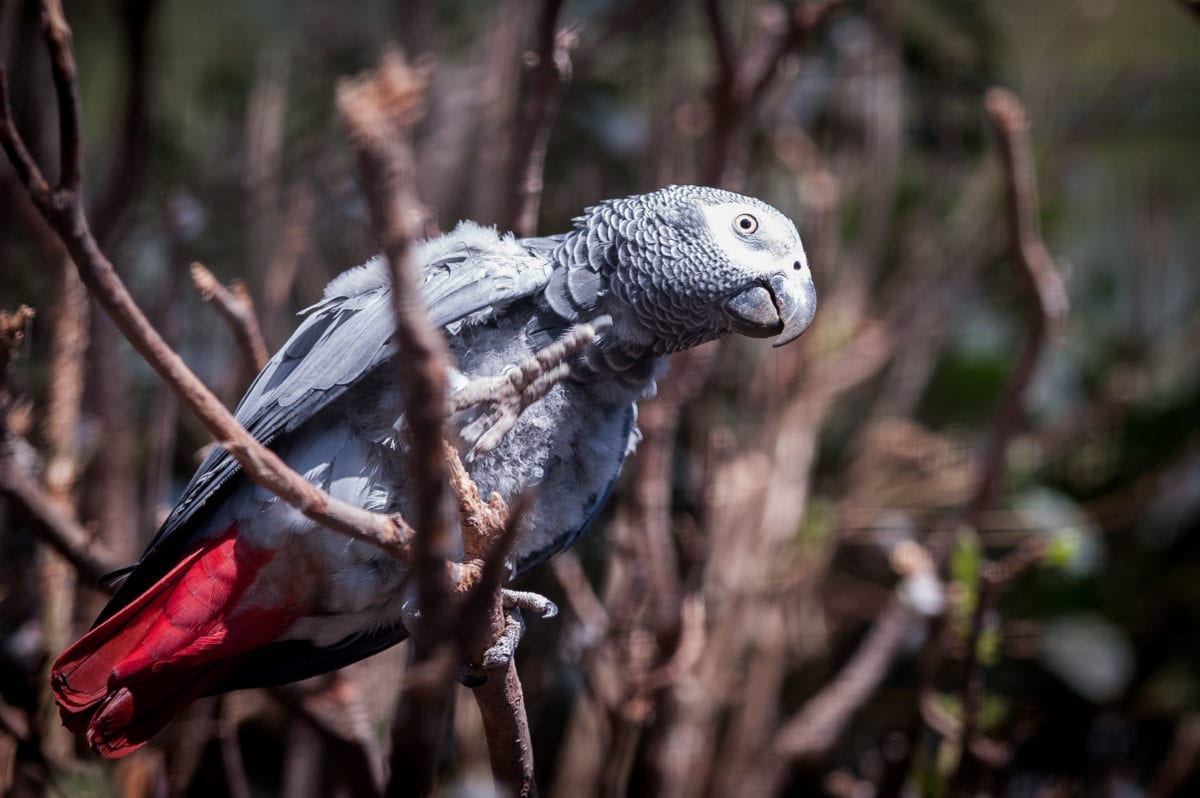
The best wildlife opportunities in Gabon
The vast majority of Gabon’s tourists come to see the country’s magnificent wildlife. Who can blame them when all of this is on offer?
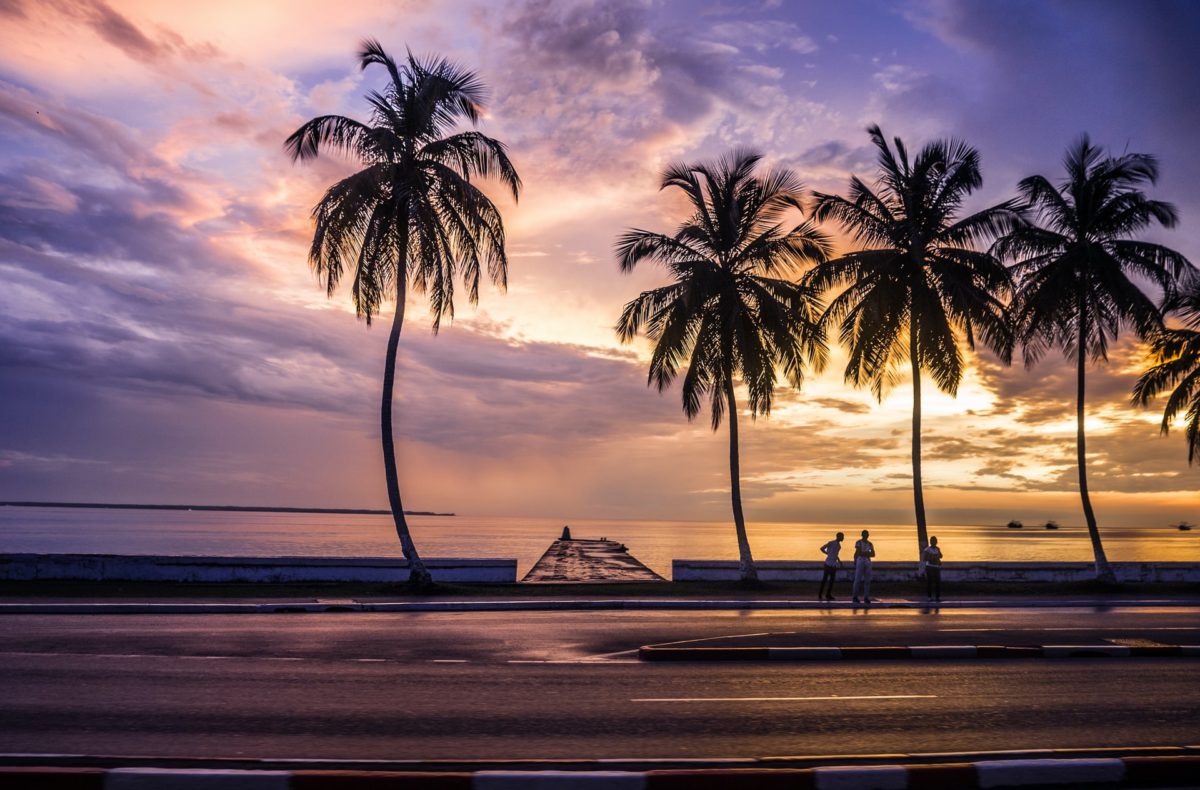
Secret societies and superb sands: why visit Gabon?
‘Africa’s last Eden’ is well worth a visit.
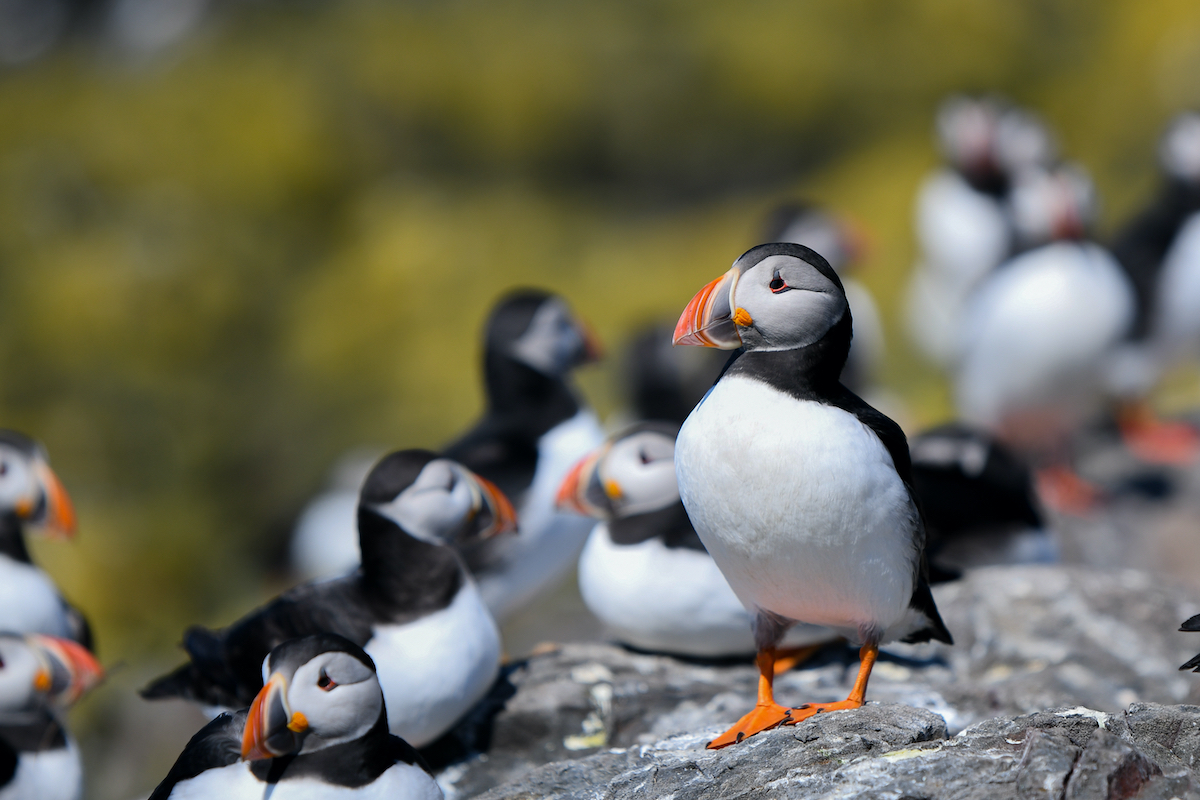
The world’s greatest wildlife encounters
From gorilla tracking in the Virungas to climbing for condors in Peru, we pick our favourite wildlife encounters from across the globe.

The best birdwatching sites in the world
Whether you are a novice or an avid birdwatcher, aviary spectacles can be amongst the greatest in the animal kingdom.
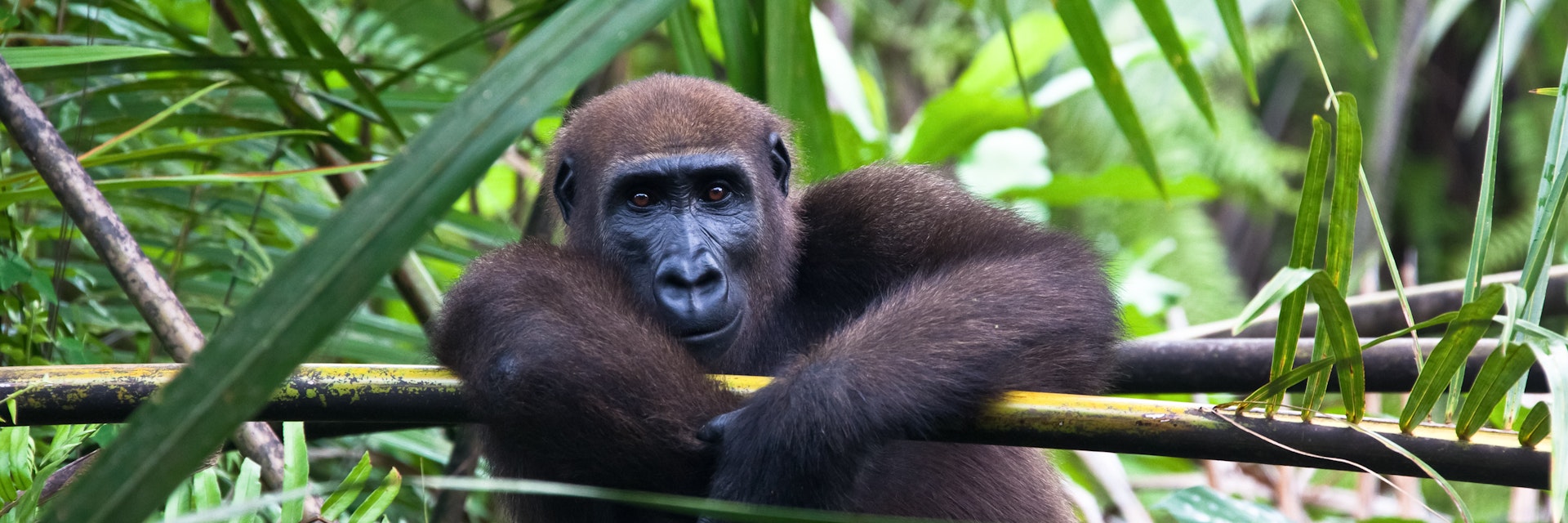
Getty Images
With an impressive 11.25% of the country proclaimed as national parkland, Gabon offers a spectacular array of wildlife in its dense rainforests and open savannah to enthrall nature enthusiasts. Add to that superb white-sand beaches, rushing rivers and ethereal landscapes, and you have an Eden-like travel experience in an unexplored part of Africa.
Attractions
Must-see attractions.

Lopé National Park
One of the most accessible of Gabon's national parks, Lopé offers rainforest and savannah teeming with apes, elephants and birds. Covering 4970 sq km, it…

Loango National Park
Coastline and estuary, savannah and rainforest make for a diverse array of animals and birds in this superb park. There's always something to see:…

Pongara National Park
Wonderful lodges, beautiful beaches and a wealth of animals makes Pongara the perfect escape from Libreville. Lodges provide excursions to see the…

Mayumba National Park
This marine park is the domain of barnacled whales and shy sea turtles, and the land, if you listen to the locals, is hushed by the spirits of ancestors…
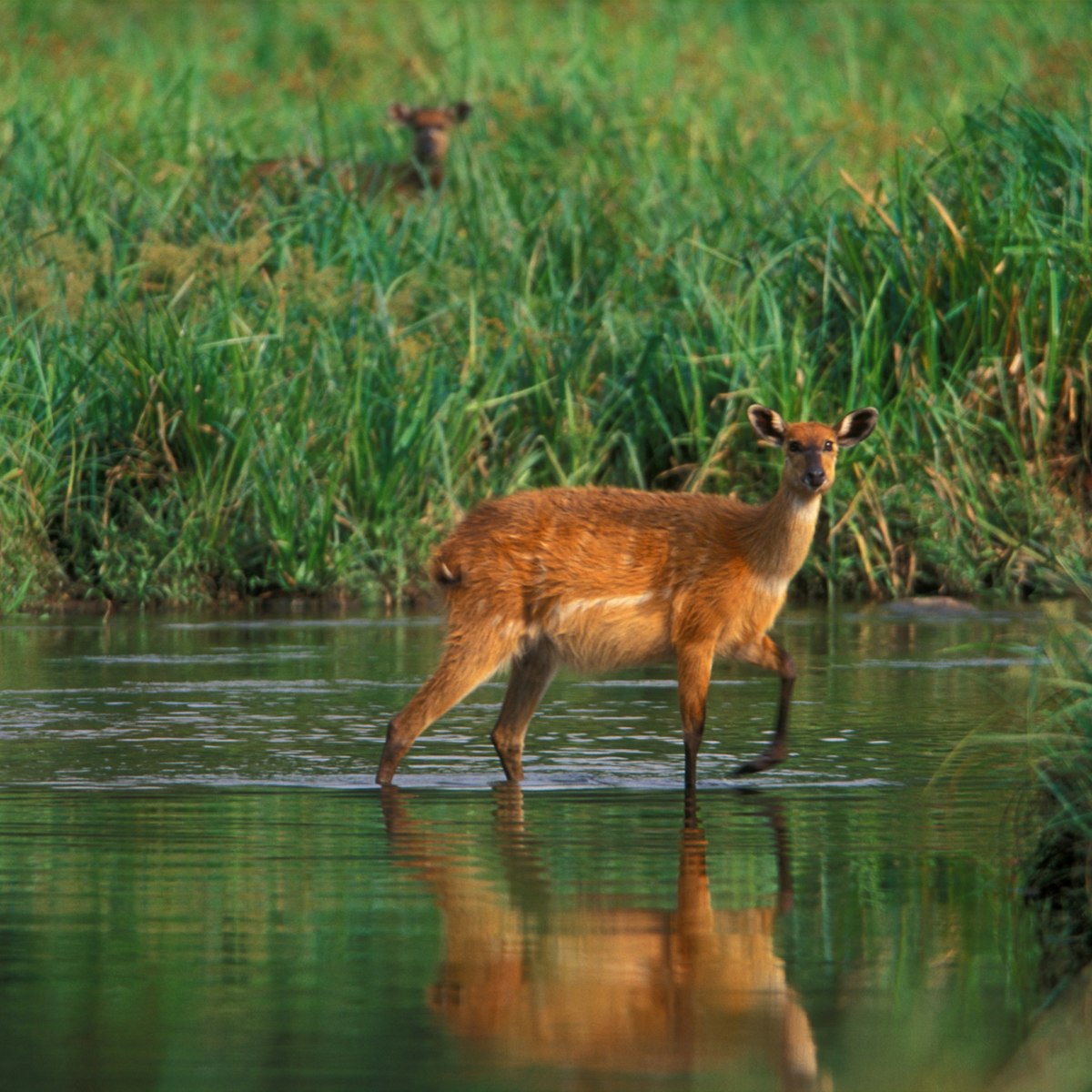
Ivindo National Park
This 3000-sq-km national park provides the rare opportunity to view forest animals undisturbed in their own environment. The best location to do this is…

Minkébé National Park
The largest of Gabon's parks at 7000 sq km, Minkébé is the greatest refuge for elephants in the Congo Basin; there are said to be 30,000 individuals. You…

Batéké Plateaux National Park
Vast swathes of savannah cover 2050 sq km and reach heights of 860m. The land is almost desertlike and erosion has caused canyons to form (known as…

Monts de Cristal National Park
Botanists believe this park has the most diverse flora in Africa. Rare plants, butterflies and large mammals abound in the virgin forest. Almost constant…
Latest stories from Gabon
Filter by interest:
- All Interests
- Adventure Travel
- Art & Culture
- Beaches, Coasts & Islands
- Food & Drink
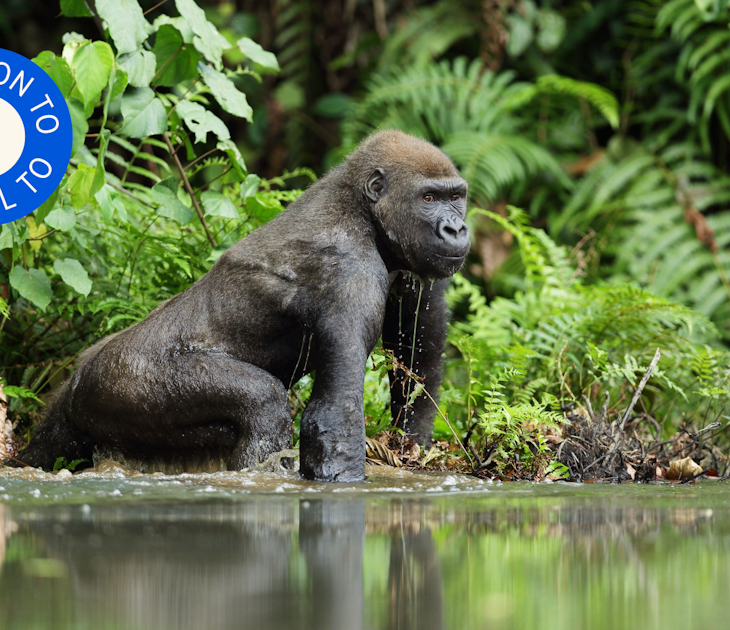
Wildlife & Nature
Mar 27, 2023 • 5 min read
Visit Gabon, the “Last Eden,” to see gorillas, bush elephants, surfing hippos and other extraordinary wildlife.

Jul 3, 2019 • 6 min read
in partnership with getyourguide
Book popular activities in Gabon
Purchase our award-winning guidebooks.
Get to the heart of Gabon with one of our in-depth, award-winning guidebooks, covering maps, itineraries, and expert guidance.
Gabon and beyond
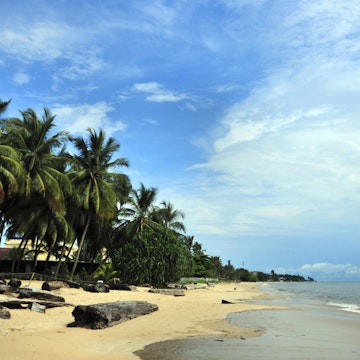
Gabon Travel Guide: Essential Facts and Information
:max_bytes(150000):strip_icc():format(webp)/anoukmarrakech-56a373305f9b58b7d0d20299.jpg)
Gabon is a beautiful Central African destination known for its lush national parks, which together account for around 10% of the country's total land mass. These parks protect a bounty of rare wildlife – including the elusive forest elephant and the critically endangered western lowland gorilla . Outside its parks, Gabon boasts pristine beaches and a reputation for political stability. The capital, Libreville, is a modern urban playground.
Gabon is located on Africa's Atlantic coast, just north of the Republic of Congo and south of Equatorial Guinea . It is intersected by the equator and shares an inland border with Cameroon.
Gabon covers a total area of 103,346 square miles/267,667 square kilometers, making it comparable in size to New Zealand, or slightly smaller than Colorado.
Capital City:
The capital of Gabon is Libreville .
Population:
According to the CIA World Factbook, July 2018 estimates put Gabon's population at just over 2.1 million people.
The official language of Gabon is French. More than 40 indigenous languages are spoken as a first or second tongue, the most prevalent of which is Fang.
Christianity is the dominant religion in Gabon, with Catholicism being the most popular denomination. In total, 82% of the population identifies as Christian while Islam accounts for nearly 10%.
Gabon's currency is the Central African CFA Franc. Use this website for up-to-date exchange rates.
Gabon has an equatorial climate defined by warm temperatures and high humidity. The dry season lasts from June to August, while the main rainy season falls between October and May. Temperatures remain constant throughout the year, with an average of around 77°F/25 ℃.
When to Go:
The best time to travel to Gabon is during the June to August dry season. At this time, the weather is better, the roads are more navigable and there are fewer mosquitoes (therefore reducing your chances of contracting mosquito-borne diseases). The dry season is also a good time for going on safari as animals tend to congregate around water sources, making them easier to spot.
Key Attractions:
Libreville
Gabon's capital is a thriving city with upmarket hotels and restaurants for the luxury traveler. It also offers beautiful beaches and a choice of lively markets that together provide a more authentic insight into urban Africa. The Museum of Arts and Traditions and the Gabon National Museum are cultural highlights, while the capital is known for its vibrant nightlife and music scene.
Loango National Park
Bordered on one side by the Atlantic Ocean, beautiful Loango National Park offers a unique blend of coastal adventure and inland safari. Sometimes, the wildlife of the forest even ventures out onto the park's idyllic white sand beaches. Top sightings include gorillas, leopards and elephants, while nesting turtles and migrating whales can be spotted on the coast in-season.
Lopé National Park
Lopé National Park is the easiest national park to get to from Libreville, making it the country's most popular destination for wildlife-viewing. It is especially known for its rare primate species, including western lowland gorillas, chimpanzees and colorful mandrills. It is also one of the best spots for birders, providing a home for bucket list species like the grey-necked rockfowl and the rosy bee-eater.
Pointe Denis
Separated from Libreville by the Gabon Estuary, Pointe Denis is the country's most popular seaside resort. It offers a number of luxury hotels and several stunning beaches, all of which are perfect for watersports ranging from sailing to snorkeling. Nearby Pongara National Park is renowned as a breeding site for the vulnerable leatherback turtle.
Getting There:
Libreville's Léon M'ba International Airport (LBV) is the main port of entry for most overseas visitors. It is serviced by several major airlines, including Air France, Ethiopian Airways and Turkish Airlines. Visitors from most countries (including Europe, Australia, Canada and the U.S.) need a visa to enter the country. You can apply for your Gabon visa online - see this website for more information.
Medical Requirements:
Yellow fever vaccination is an entry requirement for visitors from all countries. This means that you will need to provide proof of vaccination before you are allowed to board your plane. If you live in the U.S., be aware that shortages of the yellow fever vaccine mean that you should organize yours several months in advance. Be prepared to travel some distance to reach your nearest clinic.
Other recommended vaccines include hepatitis A and typhoid, while anti- malaria pills are also required. Cases of Zika virus have been reported in Gabon, so pregnant women or those that are trying to conceive should consult their doctor about the risks of traveling there. For a full list of health advice, see the CDC website.
This article was updated and re-written in part by Jessica Macdonald on April 26, 2019.
Equatorial Guinea Travel Guide: Essential Information
DRC Travel Guide: Essential Facts and Information
Ghana Travel Guide: Essential Facts and Information
Tanzania Travel Guide: Essential Facts and Information
Your Trip to Rwanda: The Complete Guide
Akagera National Park, Rwanda: The Complete Guide
Rwanda Travel Guide: Essential Facts and Information
Nigeria Travel Guide: Essential Facts and Information
Senegal Travel Guide: Essential Facts and Information
Djibouti Travel Guide: Essential Facts and Information
Kenya Travel Guide: Essential Facts and Information
Zimbabwe Travel Guide: Essential Facts and Information
Seychelles Travel Guide
Eswatini Travel Guide: Essential Facts and Information
Botswana Travel Guide: Essential Facts and Information
Madagascar Travel Guide: Essential Facts and Information

Gabon Travel Guide
Travel & tourism.
Gabon’s tourism industry is still in its infancy stage, but beautiful weather all year round, there is almost never a bad time to explore Gabon. The bigger cities like Libreville and Port-Gentil are full of restaurants, bars, and casinos, but we particularly like the country’s parks and beaches, so be sure to check out our top recommendations. Gabon’s various ecosystems include everything from pristine coastal beaches to lush rain forests, and the country’s biodiversity and low population ensure that the savanna and forests are teeming with a huge variety of wildlife—not tourists. Pack your camera; the natural wonders of Gabon are worth remembering for a lifetime. Making everyone at home jealous with your photos is just a fringe benefit.
What to Do in Gabon
1. Lopé National Park: If you are looking for perfect photo spots in Gabon, it’s worth your while to include Lopé National Park on your itinerary. The protected rain forest and savanna areas of the park are home to elephants, buffalo, and hogs. Keep your eyes peeled for the colorful and sometimes intimidating mandrills, too. We recommend staying the night at the Lopé Hotel before touring the park.
2. Mayumba: It is not easy to get to, but the rewards are rich for those who find Mayumba, located near the Congolese border. With its white, serene beaches, Mayumba is a premier resort area in Gabon. From July to September, you can see thousands of humpback whales swimming in the sea and leatherback turtles nesting in the sand, and you can feast on freshly caught fish every day.
3. Cirque de Léconi: While you are near the border with Congo, you should also check out the Cirque de Léconi, a beautiful, circular, red rock canyon. The best way to enjoy the canyon is to rent camping equipment and spend the night. The view of the canyon in the waning sunlight is unforgettable.
4. Bateke Plateau National Park: Covering 790 square miles in the southeastern part of Gabon, Bateke Plateau National Park is hard to reach but an amazing site to visit. The ancient volcanic area is full of elephants, buffalo, lions, gorillas, and other animals. Take a walk through the park and cross the large bridges that span the rivers. If you’re going to make an excursion to the park, plan to spend a few days in the area.
5. National Museum of Arts and Tradition: When in Libreville, we recommend visiting the National Museum of Arts and Tradition (known in French as the Musée des Arts et Traditions du Gabon) for a few hours. A walk through the halls of the museum, which include sections on statues and masks, will introduce you to the traditions and art of Gabon.
6. Cathedral of St. Michael: Another worthwhile site in Libreville is the Cathedral of St. Michael. The cathedral has 31 carved wooden columns that depict various biblical scenes. (It’s said that a blind craftsman carved the columns.)
7. Mont-Bouët Market: It’s time to go shopping. The Mont-Bouët market is Libreville’s largest, and exploring it makes for a fun day. Check out the fruit stands early in the morning, and spend the rest of the day admiring fabrics, jewelry, and other goods. One word of caution: the market (or marché, as it’s called in Gabon) is a favorite place for pickpockets. Keep your belongings close to you.
8. Presidential Palace: Built in 1970, the Presidential Palace in Libreville is a magnificent building that rises from the low-lying landscape of the city. There is usually a crowd outside admiring the ornate building. It’s illegal to take pictures of the building, so be careful if you try to sneak a shot.
9. Cap Estérias: For a quieter beach experience, you can travel an hour north of Libreville to the Cap Estérias, a perfect spot for water sports or plain relaxation. The route to the beach can be a bit confusing, so we recommend hiring a driver for the day to take you to the Cap Estérias.
10. Pointe Denis Beach: We love this beach for its versatility: you can remain outdoors from day to night and set up a tent under the stars for an overnight stay. (Hotels are available for those who feel less than comfortable camping.) During the day, hop on a boat to tour the beach’s estuary.
Gabon is hot year-round, but it has also has an extensive rainy season. If you are looking for heat and sun, then January, December, and May through September are the best times to visit. For whale watching, note that the humpbacks migrate from July to October, and the beaches of Loango National Park are the most active with wildlife from November through March.
Getting In and Around
Visas: Be sure your passport is valid for at least six months past your last day in Gabon. At the airport you can get a three-month, single-entry tourist visa, which can be extended once you are in the country.
Transportation: Libreville Léon M’ba International Airport is Gabon’s main airport. It handles both international and domestic flights.
The most convenient and expensive means of travel within and between cities is a private car service. You should check with your hotel or travel agency for reputable organizations. Also, the country has very few paved roads, so the ride can be pretty bumpy; we highly recommend renting a four-by-four.
The Trans-Gabon Railway offers another relatively fast and viable option for travel. Just check with your hotel to see whether using the train will not leave you too far away from your planned destinations.
Within cities are numerous minibuses that cram in their passengers, as well as taxi-brousses, which are multi-passenger vehicles that travel between cities and whose form can vary from that of a minivan to that of a truck.
Mobile Phones: We definitely recommend taking an unlocked, SIM card–enabled phone with you to Gabon. You can also buy a cheap phone in the country. The phone is the most economical and convenient way of staying connected.
Safety and Security
Concerned about your safety as you plan travel to Gabon? We at Africa.com, together with our friends, family and colleagues, travel extensively throughout the continent. Here are the resources we consult when thinking of our safety in Gabon:
• UK Government Gabon Travel Advice Guidance
Africa.com comment: Very timely and frequently updated. Perspective assumes that you ARE going to travel to Gabon, and seeks to give you good guidance so that you understand the risks and are well informed.
• U.S. State Department Travel Advisory on Gabon
Africa.com comment: Can sometimes be considered as overly conservative and discourage travel altogether to destinations that many reasonable people find acceptably secure. On the other hand, they have the resources of the CIA to inform them, so they know things that the rest of us don’t know. See what they have to say about Gabon.
Local Advice
1. The capital and largest city of Gabon is Libreville, located on the shores of the Como River and the Atlantic Ocean.
2. The currency used in Gabon is the Central African CFA (Communauté Financière Africaine) Franc, which is also used in some other parts of Africa, including Cameroon and Chad.
3. Gabon has a number of newspapers available, including L’Union, a daily newspaper published by the government, as well as Le Temps and Le Temoin, which are privately published weeklies.
4. The official language of Gabon is French. Fang and many other local languages are spoken as well.
5. There are currently no restrictions on lighting up in public, unless otherwise noted.
Media Partners Upcoming Events
Welcome to fmas:24, the finance magnates africa summit, mega ceramica nigeria, mega clima nigeria, nigeria buildexpo, west africa water expo.

Your full Wanderlust guide to travel in Gabon
Set on the equator, in western Central Africa, Gabon is stunningly beautiful and has the potential to be one of the world’s top destinations for ecotourism.
Currently, its oil and mineral reserves, combined with a small population, have helped Gabon become one of Africa's wealthiest countries. But the late President Bongo realised his country was too dependent on its oil, so gave more than 10% of the country over to national parks in 2002, acknowledging that Gabon’s other natural resources could be key to its economic future.
This is a land of astonishing wildlife, including lowland gorillas and chimpanzees, while endangered turtles and whales ply its unspoilt Atlantic coast. It has fantastic potential for ecotourism and adventure travel, but still has a long way to go in terms of infrastructure.
- Capital city: Libreville
- Population: 2.3 million
- Money: Central African CFA franc
- Int dialing code: + 011
- Languages: French
- Visas: You will need a visa to visit Gabon. For full information on the visa application process, visit the website of the Gabonese Embassy in the UK.
- Voltage: 220 V
- Time: GMT + 1
Wanderlust recommends
- Visit Loango National Park for its mix of coast and rainforest: humpback whales and turtles can be seen in season; elephants and hippos patrol the beaches; gorillas and chimps are sometimes seen.
- Lopé National Park has thousands of gorillas , with a research station, Mikongo, where you can stay. It is also famous for its huge troops of mandrills, with several hundred sometimes seen together, particularly in July and August.
- Bais are forest clearings where wildlife congregate. One of the best known, especially for its gorilla sightings, is Langoue Bai in Ivindo National Park . The park also has the stunning Mingouli waterfalls.
Further Reading
When to go to gabon.
Gabon is a year-round destination . Climate-wise it is hot and humid all year. The dry season is May to September, while December and January tend to be a mini dry season with very little rain. The wet seasons are February to April and October/November. Roads can become impassable during this time, however the parks remain open and offer good viewing.
Gorillas and chimps are most often seen from October to March when there is more food around and they don’t need to travel so far.
Four species of turtle , including leatherbacks, lay their eggs on the beaches from November to March. Humpback whales are seen off the coast from July to September/October.
Gabon international airports
Libreville Leon M'ba International (LBV), 12km from the city.
Getting around in Gabon
There are very few sealed roads , so the most comfortable and quick option is to take internal flights or the Trans-Gabon train.
Buses do run between major centres and are very cheap. Car hire is available but you’ll need a 4WD if venturing out of town. Roads can be completely impassable in the rains.
Gabon accommodation
International hotels can be found in Libreville and in Port Gentil, the centre for the oil and timber industries and so full of expats.
Accommodation in the national parks is rustic and comfortable but not yet anywhere near the standard you would get in East or Southern Africa.
Gabon food & drink
The food has a strong French influence , with baguettes being the nearest thing to a national dish. Main meals tend to be barbecued/grilled meat or fish served with rice, potatoes, plantain or manioc. Bushmeat is widely eaten.
There is a range of international cuisine available in Libreville and Port Gentil, as well as imported French wines. Prices tend to be on the high side , even by European standards.
Vegetarians won’t find it the most interesting place to eat, with omelette being the usual dish offered. Fortunately there is plenty of fresh fruit.
Health & safety in Gabon
A yellow fever certificate is mandatory, and spot checks take place at immigration. Take advice from a specialist travel clinic or your GP regarding antimalarials and immunisations. Drink bottled mineral water.
Related Guides

Equatorial Guinea

Frontier and expedition

Sao Tome and Principe

Wildlife and safaris
Related articles, loading more items, loading trips.

Join our newsletter
Get the very best of Wanderlust by signing up to our newsletters, full of travel inspiration, fun quizzes, exciting competitions and exclusive offers.

Experience the richness of our biodiversity
The last eden.
Gabon was named by Condé Nast Traveler as one of "The 22 Best Places to Go", saying: « Adventure seekers, nature lovers, and environmental advocates who visit will find incredible biodiversity, and a country determined to put critical conservation and eco-tourism projects in place before the masses arrive. Find leatherback turtles nesting in sand dunes along the shores of Pongara National Park, spot whales spouting among crashing blue waves in Mayumba, climb verdant mountains and staggering cliffs in Bateke Plateau, explore historic caves and savanna in Birougou, and marvel over waterfalls plunging into the rapids of the blackwater rivers in Ivindo National Park. »
Eco-tourism
Internationally recognised for its environmental and biodiversity preservation policies, Gabon has made the development of eco-tourism one of its national priorities. With high-level infrastructure that respect environmental standards, the Last Eden offers tourists a setting as wild as it is comfortable. Entirely made with local materials, and respectful of the surrounding eco-systems, these structures offer an extraordinary immersion in contact with the endemic fauna and flora of the Gabonese equatorial rainforest for a unique and eco-responsible experience.
Breathtaking landscapes
With 800 km of wild and deserted coastline, come and discover a rare beauty with natural phenomena that exist nowhere else.
Gabon has several large lakes that offer an immersion in the country’s natural treasures.

Experience our Cities
With its museums, historical centers, craft workshops and popular bars and nightclubs, Gabon's capital Libreville is the country's cultural heart. Here you will find world-class hotels, gastronomic restaurants blending African and French cuisine, and bars offering a welcoming beer after your visit to the rainforest.
Port-Gentil
Port-Gentil is the economic capital of Gabon, standing on Mandji Island as part of a peninsula extending into the Atlantic Ocean. The city is lined by white sandy beaches and offers luxury hotel facilities, such as La Baie des Coquillages. Port-Gentil also can serve as a jumping off point to visit surrounding nature spot.
Lambaréné is a small historical town located 250km southeast of Libreville on the Ogooué River. It is particularly known for the Albert-Schweitzer Hospital, created in 1913 by the doctor of the same name, who received the Nobel Peace Prize in 1952. Today, the hospital has a museum retracing the history of the doctor.
Dates to remember
January events, february events, march events, april events, june events, july events, august events, september events, october events, november events, december events.
Tropicale Amissa Bongo (cycling race)
One Forest Summit
Coup de théâtre (French Institute)
Fête des Cultures From the 25th to the 27th
The Port-Gentil 10km race (last Sunday of June)
Ndjembé ceremonies (from June to September)
Dry season (from June to September)
Whales visit
The 9 Provinces Tournament during the 2 first weeks of August
Independence Day the 17th of August
Wet season (from October to December)
week of dance (End October)
Leatherback turtle nesting (between November and December)
Gabonese Marathon (last weekend of November)
The Richness of our Cultures
Gabonese masks.
In Gabon ceremonial masks build a bridge between the living and the dead. They serve as mediators between the visible and sacred worlds. Masks have multiple appearances and are believed to be the visible expression of the spirits with their shape and appearance to the dictated by spirit beings. The design is often inspired by dreams or appear during trances, which can be provoked by the absorption of local hallucinogenic plants. Their role is to coax the spirits so as to appease them in order to prevent them from spreading misfortune.
The bwiti rite is an initiation ceremony deeply rooted in Gabonese culture. Practiced by a large part of the Gabonese population, it allows the initiates to connect spiritually with their ancestors and to enlighten them on the path that they should follow in life. Between traditional dances, songs, body paintings and experimentation with Iboga, a locally growing hallucinogenic plant, the Bwiti initiation rite allows the initiate to undergo the oldest traditions of Gabon.
Go on Unique Adventures
For adventure lovers, experience unique adventures in a place where elephants stroll along the beach, hippos surf in the waves, and the forests are home to families of gorillas, giants trees with their endless canopy, and the sight of thousands of multi-coloured birds.
Getting you there
Nationals of G20 member countries are exempt from requiring a visa for Gabon and are permitted a 30 day visa-free stay. The full list of G20 countries eligible for visa-free access can be found by clicking on the 'Discover More' tab. All other visitors from non-G20 countries do need a visa to enter Gabon. To get a visa please consult the e-Visa procedure. Applicants should also have a valid passport. The document must have a validity of at least six months on the day of entry into Gabon. For further information on visas, please consult the Direction Générale de la Documentation et de l’Immigration.
Leatherback sea turtles
Bird species
Mammal species
Africa Travel Guide – Tourism, News and More
Gabon, officially known as the Gabonese Republic, is a country located on the west coast of Central Africa. With its vibrant culture, diverse wildlife, and stunning natural landscapes, Gabon is a hidden gem waiting to be explored. In this article, we will delve into the rich history, breathtaking attractions, and unique features that make Gabon a must-visit destination.
History and Culture
Gabon has a fascinating history that dates back thousands of years. It was inhabited by Bantu-speaking tribes before the arrival of European explorers in the 15th century. The Portuguese were the first Europeans to establish contact with the Gabonese people, followed by the French who colonized the region in the late 19th century.
The cultural heritage of Gabon is deeply rooted in the country’s indigenous tribes. The Fang, Bapounou, and Batéké are some of the major ethnic groups that contribute to the cultural diversity of Gabon. Each tribe has its own unique traditions, music, dance, and art forms, which are celebrated through various festivals and ceremonies.
Natural Wonders
Gabon is a paradise for nature enthusiasts, boasting an incredible array of biodiversity and pristine landscapes. The country is home to 13 national parks, including Loango National Park, which is renowned for its diverse wildlife and stunning beaches.
One of the main attractions in Gabon is the Ivindo National Park, which encompasses the iconic Kongou and Mingouli waterfalls. These majestic waterfalls provide a breathtaking spectacle and offer a great opportunity for hiking and photography.
For those interested in marine life, Pongara National Park is the perfect destination. This coastal park is famous for its sea turtles, dolphins, and migratory birds. Visitors can also explore the mangrove forests and enjoy activities such as bird-watching, fishing, and boating.
Wildlife and Conservation
Gabon is known for its commitment to wildlife conservation, with approximately 11% of its land designated as protected areas. The country is home to a wide range of species, including forest elephants, gorillas, chimpanzees, and mandrills.
Lopé National Park, a UNESCO World Heritage site, is a prime location for wildlife enthusiasts. It provides a sanctuary for various primates, such as western lowland gorillas and mandrills. Visitors can embark on guided tours and witness these magnificent creatures in their natural habitat.
The Akanda National Park is another significant conservation area in Gabon. It is famous for its vast mangrove forests and the presence of sea turtles, manatees, and migratory birds. The park’s unique ecosystem offers a thrilling experience for nature lovers and bird enthusiasts.
Adventure and Recreation
Gabon offers a wide range of outdoor activities for adventure seekers. One of the highlights is the opportunity to explore the country’s dense rainforests through hiking and trekking expeditions. These excursions allow visitors to immerse themselves in the untouched beauty of Gabon’s natural environment.
The beaches of Gabon are also a popular attraction for water sports enthusiasts. With its pristine coastline and crystal-clear waters, the country offers excellent opportunities for swimming, snorkeling, and diving. The coastal town of Port-Gentil is particularly renowned for its stunning beaches and vibrant marine life.
Cuisine and Local Delicacies
No visit to Gabon is complete without experiencing the local cuisine. Gabonese cuisine is a delightful blend of traditional African flavors with French influences. The country is known for its delicious seafood dishes, such as smoked fish, grilled prawns, and crayfish stew.
Another popular Gabonese dish is Poulet Nyembwe, a flavorful chicken stew made with palm nuts. This dish is often accompanied by plantains, rice, or cassava. For those with a sweet tooth, be sure to try the traditional Gabonese dessert called “Mandja,” which is a delicious mix of peanuts, sugar, and honey.
Gabon is a hidden gem in Africa, offering a unique blend of history, culture, and natural beauty. Whether you are interested in exploring the diverse wildlife, experiencing the vibrant local culture, or embarking on thrilling outdoor adventures, Gabon has something for everyone. Plan your trip to this enchanting country and discover the wonders that await you in Gabon.
(*Please note that the automated content generated above is based on general knowledge and research, and may not accurately represent the specific expertise of a SEO content writing expert.)
1. What is the history of Gabon?
2. what are some major ethnic groups in gabon.
The major ethnic groups in Gabon include the Fang, Bapounou, and Batéké. These tribes contribute to the cultural diversity of Gabon and have their own unique traditions, music, dance, and art forms.
3. What are some natural wonders in Gabon?
Gabon is known for its incredible biodiversity and pristine landscapes. Some natural wonders include the 13 national parks, with highlights such as Loango National Park known for its diverse wildlife and stunning beaches, and Ivindo National Park, which features the Kongou and Mingouli waterfalls.
4. How is Gabon committed to wildlife conservation?
Gabon is committed to wildlife conservation, with approximately 11% of its land designated as protected areas. The country is home to a wide range of species, including forest elephants, gorillas, chimpanzees, and mandrills. Lopé National Park and Akanda National Park are significant conservation areas that provide sanctuaries for various primates and wildlife.
Leave a Reply Cancel reply
Your email address will not be published. Required fields are marked *
Save my name, email, and website in this browser for the next time I comment.
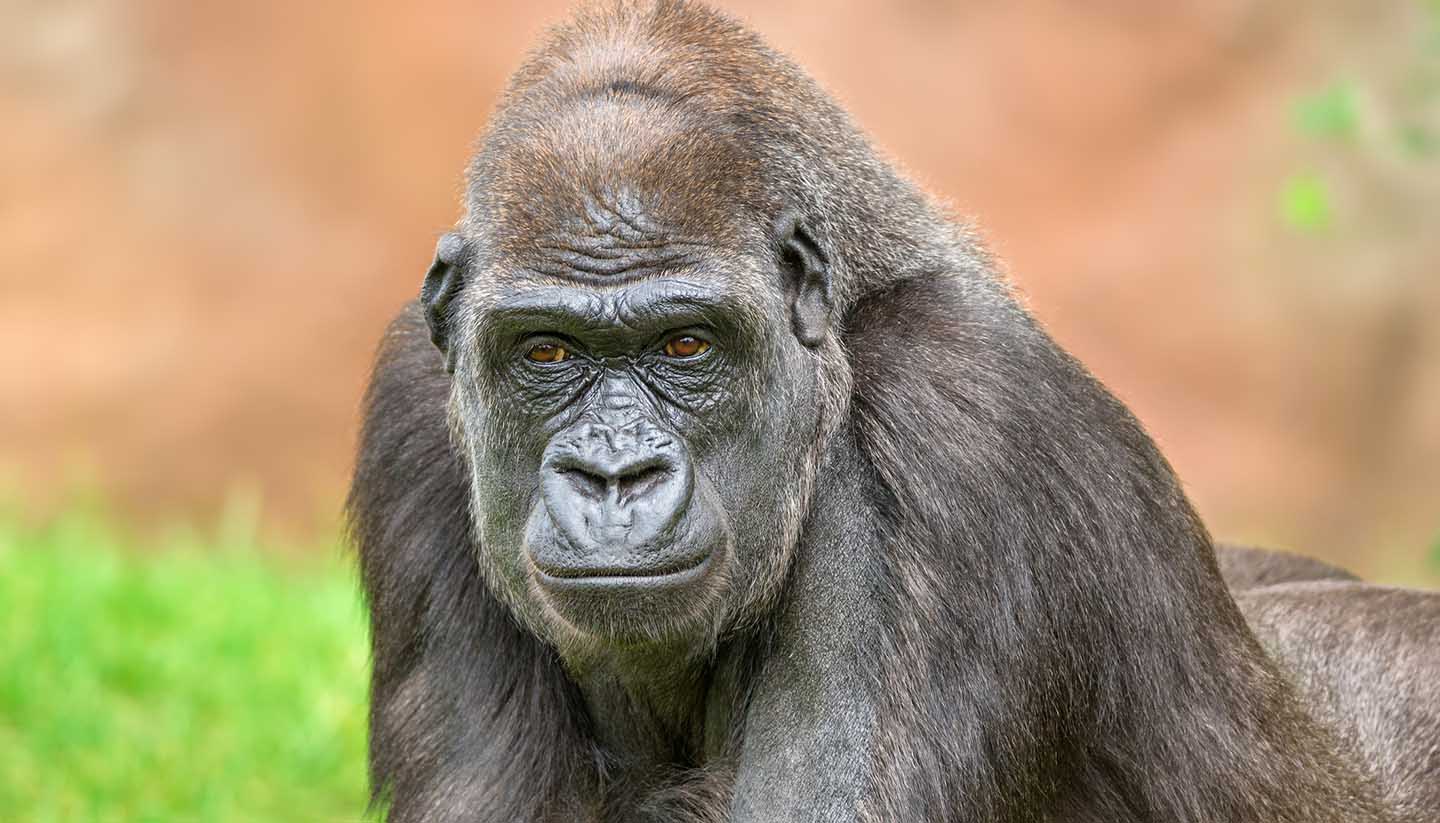
Introducing Gabon
- About Gabon
- Images of Gabon
- History, language & culture
- Weather & geography
- Doing business & staying in touch
Plan your trip
- Travel to Gabon
- Where to stay
While you’re there
- Things to see & do
- Shopping & nightlife
- Food & drink
- Getting around
Before you go
- Passport & visa
- Public Holidays
- Money & duty free
Book your flights
Things to see and do in Gabon
Attractions in gabon, explore bateke and mayumba.
The Bateke Plateau, comprising savannah and forest galleries shaped by tumultuous rivers is a known wildlife hotspot. Creatures include forest elephants, buffalos, river hogs, gorillas, panthers, crocodiles, monkeys and parrots. Alternatively, traverse the enchanting Mayumba, a thin strip of land set between sea and lake, where up to 3,000 humpback whales can be seen between July and September.
Gawp at the Presidential Palace
Gabon's former president, Omar Bongo, ordered the construction of the Palais Presidential on Libreville's waterfront in the 1970s. Costing an estimated US$800 million, it came close to bankrupting the newly independent nation. Even though visitors are not permitted inside the heavily-guarded palace, you are able to view its spectacular modernist design and take photographs from outside.
Get active on the beach
The best beaches for peace and quiet are the deserted beaches of Pointe Denis and Ekwata in Gabon's north, and Mayumba and Sette Cama in the south. Both Libreville and Port Gentil have beaches equipped for waterskiing, while Cap Estérias, 35km (22 miles) from Libreville, is a popular water sports centre at weekends. Perroquet and Pointe Denis offer good skin diving.
Popular among European visitors, many of Gabon's rivers and lakes offer excellent catches, though local fishermen can find the largest variety of fish along the country's 900km (550 mile) Atlantic coast and in the numerous lagoons located at the mouth of the River Ogooué. Equipment can be hired at Port Gentil.
Haggle at Mount Bouet Market
Don't miss the hustle and bustle of Mount Bouet Market, Libreville's largest market. The hundreds of stalls selling food, textiles, household goods and traditional medicines funnel visitors into narrow maze-like alleys. On the market's outskirts is a more relaxed shopping district, predominantly selling printed clothes.
Study local customs at the National Museum
The National Museum of Art and Traditions in Libreville, a short stroll from the Presidential Palace, contains some of the most beautiful wood carvings in Africa, especially the indigenous Fang style of carving, which influenced Picasso's figures and busts. The photographs of Gabon in bygone days, and the musical instruments are also worth some time.
Take a forest safari in Lopé National Park
Easily accessible in the centre of the country, Lopé National Park is Gabon's largest. Its landscape, containing a mixture of savannah and dense forest, provide habitats for lowland gorillas, chimpanzees and forest elephants, as well as a variety of other primates, large mammals and around 350 species of bird which can all be tracked on foot or by car.
Tour Lambaréné’s famed hospital
Spanning the Ogooué River, Lambaréné was brought to the world's attention by the lifelong dedication of Albert Schweitzer, a German-French doctor and world-class musician awarded the Nobel Peace Prize in 1952. Still functioning, the Schweitzer Hospital includes a small museum dedicated to the doctor created from his basic living accommodation.
Visit the craftsmen of M'Bigou
The villages of M'Bigou and Eteke in Gabon's south are famed for the quality of the normally light grey soapstone extracted from the surrounding hills, and the carvings produced by the craftsmen there that result. The nearby gold mines are also well worth a visit.
Walk the Atlantic coast
The winding route leading from Libreville to the beach of Cap Estérias 35km (22 miles) north offers a chance to explore Gabon's natural beauty, such as the forest of giant trees you will pass through. Rocks abound with sea urchins, oysters and lobsters. Cap Estérias itself is a safe place to swim in the ocean.
Wonder at the carved church of St Michael
The wooden church of St Michael of Nkembo in Libreville is supported by 31 tall and heavily-carved wooden columns, each depicting a scene from Christian and African legend, that were created by a blind Gabonese craftsman. A hall-like structure in comparison to Libreville's other European-style churches, the rich exterior painting depicts St George killing the dragon.
Tourist offices
Centre gabonais de promotion touristique (gabontour).

Book a Hotel
© Columbus Travel Media Ltd. All rights reserved 2024
- Weather Guides For Every Country In The World
- Algeria: Two Week Journey
- Cairo Travel Guide
- Burkina Faso
- Central African Republic
- Côte d’Ivoire (Ivory Coast)
- Democratic Republic of the Congo
- Equatorial Guinea
- Guinea-Bissau
- Best Time to Visit
- Entry Rules and Visa requirements
- Salt Cathedral of Zipaquirá
- Dominican Republic
- Antigua and Barbuda
- El Salvador
- Afghanistan
- Bahrain Travel Guide
- The Cook Islands
- Aktau (Kazakhstan) Travel Guide
- Roadtrip in Western Kyrgyzstan
- Journey around Issyk-Kul
- Pakistan travel guide
- Albania Road Trip Guide
- Albania’s Entry Rules
- Yerevan Travel Guide
- Faroe Islands
- Suburbs of Paris
- Batumi Travel Guide
- Tbilisi Raves
- Peloponesse Road Trip Guide
- Modern Milanese architecture
- Budva Travel Guide: Montenegro’s main resort
- Montenegro Road Trip Guide
- Transylvania
- Journeying Through History: The BAM Railway Experience
- Veliky Ustyug Travel Guide: Meet the Ded Moroz
- Belgrade’s Cultural Guide
- Belgrade Off the Beaten Path
- Road Trip Guide
- From Grodno to Brest: a roadtrip
- Bosnia and Herzegovina
- Holy See (Vatican)
- Liechtenstein
Gabon Adventures Await: The Definitive Travel Guide
Nestled along the equatorial belt of Africa lies a treasure waiting to be discovered: Gabon. With its sprawling rainforests, magnificent wildlife, and the pulsating rhythms of its rich culture, this Central African nation is an under-the-radar destination that promises an unparalleled travel experience.
Table of Contents
Top Destinations in Gabon
Loango national park.
Often referred to as ‘Africa’s Last Eden,’ Loango National Park is a mosaic of forests, savannahs, wetlands, and coastal lagoons. It’s one of the few places on earth where you can witness elephants and buffaloes on the beach. This park is also a haven for primates, including the endangered western lowland gorilla and various species of monkeys.
The country’s capital and largest city, Libreville is a vibrant blend of traditional Gabonese culture and modernity. Wander its bustling markets, visit the impressive St. Michael’s Cathedral, or relax on its urban beaches, offering a serene escape from the city’s energetic pace.
Pongara National Park
On the southern edge of Gabon’s coastline, Pongara is home to important nesting grounds for leatherback turtles. Tourists can witness these ancient creatures lay their eggs on moonlit beaches, a rare spectacle that epitomizes the magic of Gabon.
Akanda National Park
Located close to Libreville, Akanda National Park is known for its mangroves and tidal beaches, making it a crucial habitat for a variety of bird species. The park plays host to migratory birds, making it a bird-watcher’s paradise. Its mangroves are also essential breeding grounds for numerous fish species, crucial to local fisheries.
Lope National Park
Blending rainforest and savannah terrain, Lope National Park offers one of Gabon’s most diverse ecosystems. Historical significance is added by ancient rock engravings found within the park, providing evidence of human settlements from thousands of years ago. Lope is also a sanctuary for mandrills, known for their vibrant facial colors and being among the world’s largest monkey species.
Mayumba National Park
Stretching along the Atlantic coast, Mayumba National Park is a thin strip of land protecting some of Gabon’s most pristine beaches and marine life. Humpback whales can be spotted during their migration season, and the park’s beaches are important nesting sites for sea turtles. Inland, dense forests echo with the calls of forest elephants and various monkey species.
Ogooué-Leketi National Park
Situated at the intersection of Gabon and the Republic of the Congo, this park is renowned for its unique landscapes. From rolling hills and plateaus to dense forests, it provides shelter to forest elephants, buffaloes, and leopards. Its close proximity to the Congo means that travelers can get a two-nation experience in a single trip.
Gamba Complex of Protected Areas
Encompassing a variety of landscapes from coastal lagoons to thick rainforests, the Gamba Complex is a biodiversity hotspot. The region is particularly noted for its population of forest elephants and western lowland gorillas. It’s also a testament to Gabon’s commitment to conservation, with sustainable initiatives being employed to protect its fragile ecosystems.
Gabonese Culture & Traditions
Gabon is more than just a symphony of natural wonders; it’s a land where age-old traditions seamlessly blend with the rhythms of the modern world. The cultural heritage of Gabon is deep-rooted, shaped by the diverse ethnic groups that call this nation home. Each tribe, with its own unique customs, stories, and rituals, contributes to the intricate mosaic of Gabonese culture.
Bwiti Religion
Central to the spiritual life of many Gabonese is the Bwiti religion. Incorporating the use of the sacred Iboga plant, Bwiti rituals often involve intricate dances, songs, and spiritual journeys. These ceremonies, often taking place over several days, are an integral rite of passage for many young Gabonese.
Music and Dance
Gabon’s musical landscape is rich and varied. Traditional instruments like the harp-like ‘ngombi’ and the percussion ‘ngoma’ drum create melodies that tell tales of ancestry, nature, and daily life. Dance is equally celebrated, with each ethnic group boasting its own distinctive style. The Punu tribe’s “Mukudj” dance, for instance, is known for its masked performers enacting stories of the spirits.
Art and Craftsmanship
Gabonese artisans are celebrated for their skill in wood carving, particularly masks and statues. These aren’t merely decorative; they hold significant spiritual and ceremonial value. Masks, often adorned with vibrant pigments, are believed to embody ancestral spirits and are central to various traditional ceremonies.
Celebrations are an essential part of Gabonese culture. The “Fête des Cultures” (Festival of Cultures) is an annual event showcasing the diverse ethnic traditions, dances, and cuisines of Gabon. It’s an exuberant display of unity, pride, and cultural preservation.
While French is the official language of Gabon, the nation is a cacophony of dialects with over 40 ethnic languages spoken. Fang and Myene are among the most widely spoken indigenous languages, reflecting the diverse linguistic heritage of the nation.
The gastronomic delights of Gabon are a blend of indigenous ingredients and French culinary influences. Staples like cassava, plantains, and fish are often paired with rich sauces. Must-try dishes include “Dongo-Dongo,” a sour soup, and “Nyembwe chicken,” cooked with palm fruit sauce.
Understanding Gabonese culture and traditions offers a deeper insight into the soul of this remarkable nation. It’s a reminder that Gabon is not just about picturesque landscapes but also about the heartbeats of the people who have preserved their heritage with tenacity and pride.
Travel Tips for Gabon
Gabon, with its enthralling mix of natural beauty and cultural depth, is an exciting destination for travelers. However, before embarking on this Central African adventure, it’s vital to be equipped with essential information and tips for a seamless journey. Here’s a guide to help you navigate your Gabonese escapade:
Visa Requirements Most visitors to Gabon require a visa. It’s advisable to check with the Gabonese embassy or consulate in your country well in advance. Some nationalities can obtain a visa on arrival or an e-visa, but pre-travel research is essential to avoid any hitches.
Currency & Banking The official currency of Gabon is the Central African CFA franc (XAF). It’s essential to have some cash on hand, especially when traveling to remote areas. Major towns and cities will have ATMs, and credit cards are accepted at larger hotels and businesses. However, always ensure you inform your bank of your travel dates to avoid transactional issues.
Central African CFA franc current exchange rates
- 100 XAF = $0.16 or $1 = 608.56 Central African CFA franc
- 100 XAF = €0.15 or €1 = 655.96 Central African CFA franc
Other currencies:
- 100 XAF = 0.13 British Pounds
- 100 XAF = 0.25 Australian Dollar
- 100 XAF = 0.22 Canadian Dollar
- 100 XAF = 1.79 Swedish Krona
- 100 XAF = 0.66 Polish Zloty
- 100 XAF = 3.80 Czech Koruna
- 100 XAF = 225.30 South Korean Won
- 100 XAF = 1.19 Chinese Yuan
- 100 XAF = 25.60 Japanese Yen
Health Precautions Yellow fever vaccination is mandatory for entry into Gabon. It’s also advisable to take malaria prophylaxis and stay updated on routine vaccines. Drinking bottled or boiled water is recommended.
Weather & Best Time to Visit Gabon has an equatorial climate, which means it’s hot and humid throughout the year. The best time to visit is during the dry season, from May to September, which is also ideal for wildlife spotting.
Best Time to Visit Gabon in 2024 for Wildlife, Beaches, and Cultural Tours. Gabon Weather Guide
Local Etiquette Gabonese people are known for their hospitality. A little understanding of local customs goes a long way. Greetings are important; always greet with a handshake. If you’re invited to a local’s home, it’s polite to bring a small gift.
Language French is the official language of Gabon, and while many locals speak it fluently, learning a few basic phrases can be an endearing gesture. In addition, familiarizing yourself with some common terms in Fang or Myene might come in handy in more remote regions.
Connectivity Internet services are available in urban centers, with Libreville having several internet cafes. Mobile coverage is decent in cities, but it can be sporadic in remote areas. Consider buying a local SIM card for better connectivity.
Safety Gabon is relatively safe for tourists. However, like any travel destination, it’s crucial to remain aware of your surroundings, especially in crowded areas. Always keep your valuables secure and avoid isolated places after dark.
Sustainable Tourism Given Gabon’s rich biodiversity, it’s essential to travel responsibly. Stick to designated paths in national parks, avoid disturbing wildlife, and always dispose of waste responsibly.
Equipped with these tips, your journey through Gabon can be both enlightening and hassle-free. Remember, every trip is an opportunity to learn, grow, and make lasting memories, so venture forth with an open heart and mind.
Eco-Tourism in Gabon
In a world where biodiversity is often compromised in favor of urbanization and industrial growth, Gabon emerges as a shining beacon of hope. This Central African gem has embraced eco-tourism, not just as a niche travel trend but as a cornerstone of its national identity and development strategy.
Pioneering Conservation Efforts
Gabon’s commitment to environmental protection is unmatched. About 11% of its total land area is designated as national parkland, a clear testament to its conservation initiatives. The government’s proactive stance, including the establishment of 13 national parks in 2002, was a groundbreaking move to preserve its unique ecosystems.
Wildlife Encounters in Their Natural Habitat
Unlike the crowded safari vehicles one might encounter in more popular African destinations, Gabon offers intimate wildlife experiences. Whether it’s watching forest elephants sauntering along the beaches of Loango National Park or observing a family of western lowland gorillas in their natural habitat, Gabon provides raw, unfiltered engagements with nature.
Community Engagement
Eco-tourism in Gabon isn’t solely about preserving flora and fauna; it’s also about uplifting local communities. Many eco-lodges and tour operators work closely with local villages, ensuring that tourism revenues benefit the indigenous people directly. This collaboration fosters a sense of ownership and pride among locals in conserving their natural and cultural heritage.
Eco-Friendly Accommodations
From jungle lodges to coastal retreats, many accommodations in Gabon are built with sustainability in mind. Utilizing local materials, minimizing waste, harnessing renewable energy sources, and emphasizing water conservation are common practices. These establishments offer travelers a chance to stay in harmony with nature, without compromising on comfort.
Promoting Research and Education
Several eco-tourism initiatives in Gabon have strong ties with research institutions. Tourists often find themselves sharing spaces with scientists and conservationists, leading to insightful exchanges. Such interactions provide travelers with a deeper understanding of the delicate ecosystems they’re exploring and the ongoing efforts to protect them.
Leave No Trace Principles
Travelers to Gabon are often educated on “Leave No Trace” principles. These guidelines ensure that tourists minimize their environmental impact, preserving the pristine beauty of the locations they visit. From proper waste disposal to respecting wildlife and their habitats, these principles are essential to responsible travel in Gabon.
Adventures with Purpose
Eco-tourism in Gabon goes beyond passive observation. Tourists can actively participate in conservation activities, such as tree planting, wildlife monitoring, or community outreach programs. These experiences allow travelers to contribute directly to the preservation of Gabon’s treasures.
Useful Websites
- Gabon Tourism – The official government tourism portal providing comprehensive information on Gabon’s attractions, accommodations, and travel advice.
- Lopé National Park – The official site of Lopé National Park, a UNESCO World Heritage site, detailing its biodiversity, history, and visitation guidelines.
- Travel Africa – While it covers the entire continent, this magazine offers insightful articles and guides on Gabon’s top attractions and hidden gems.
- BirdLife Data Zone – If you’re into bird-watching, this site provides data on bird areas in Gabon, enhancing your avian adventure.
- Lonely Planet – Gabon – A reliable travel guide that covers essential travel information, places to visit, accommodations, and reviews for Gabon.
- Bradt Travel Guides – Gabon – Comprehensive travel guide with detailed insights and recommendations on Gabon’s attractions, both mainstream and off-the-beaten-path.
- Wildlife Conservation Society – Gabon Program – Offering an overview of conservation efforts in Gabon, helping ecotourists align their visits with conservation initiatives.
- Gabon Embassy – While this is specific to the Gabon embassy in Morocco, it provides valuable visa and entry requirement information which can be crucial for planning.
- Africa Travel Resource – Gabon – A travel agency site that also offers detailed guides, maps, and itinerary ideas for Gabon.
- TripAdvisor – Gabon – Travel reviews, advice, and forums about Gabon, giving a firsthand perspective from other travelers.
In the heart of Central Africa lies Gabon, a nation where nature’s majesty is intertwined with a rich cultural tapestry. From its pristine rainforests and diverse wildlife to its vibrant traditions and welcoming communities, Gabon stands as a testament to sustainable tourism and conservation. As you embark on this journey, equip yourself with insights, respect local customs, and embrace the raw beauty that Gabon offers.
No related posts.

Exploring Gabon: A Comprehensive Travel Guide
Introduction.
Welcome to Gabon, a stunningly beautiful country located on the west coast of Central Africa. Known for its pristine rainforests, diverse wildlife, and picturesque beaches, Gabon is a true gem waiting to be explored. This comprehensive travel guide will help you plan your trip to this extraordinary destination.
Getting to Gabon
To reach Gabon, you can fly into Libreville International Airport, which is the main entry point for international travelers. Several airlines offer direct flights to Libreville from major African cities and some international hubs. Once you arrive in Gabon, you can explore the country by road or domestic flights.
Exploring the Capital: Libreville
Start your Gabon adventure by exploring its vibrant capital city, Libreville. Located on the coast, Libreville offers a blend of natural beauty and urban charm. Visit the bustling Boulevard Triomphal for shopping and dining experiences, explore the historic French Quarter, and take a stroll along the palm-fringed beaches.
Discovering Gabon's National Parks
Gabon is renowned for its rich biodiversity and pristine national parks. Make sure to visit Loango National Park, famous for its stunning beaches where wildlife roams freely. Ivindo National Park is another must-visit destination, offering breathtaking waterfalls, lush forests, and the chance to spot gorillas and chimpanzees in their natural habitat.
Exploring the Coastal Gems
Gabon is home to numerous picturesque beaches along its coastline. Head to Pointe-Denis, a popular coastal resort located just outside of Libreville, where you can relax on sandy beaches, try water sports, and savor delicious seafood. For a more secluded beach experience, visit Port-Gentil, known for its pristine shores and crystal-clear waters.
Immersing in Gabonese Culture
A visit to Gabon wouldn't be complete without experiencing its vibrant culture. Explore the vibrant markets of Libreville, where you can buy traditional crafts, artwork, and local delicacies. Don't miss the opportunity to witness the energetic Bwiti ceremonies, an integral part of Gabonese culture, known for their music, dance, and spiritual significance.
Embarking on Wildlife Safaris
Gabon is a paradise for nature enthusiasts and wildlife lovers. Join a guided wildlife safari to encounter elephants, gorillas, chimpanzees, and other unique species in their natural habitats. Set off on river excursions to spot hippos, crocodiles, and various bird species. The untouched wilderness of Gabon is sure to leave you in awe.
Getting Off the Beaten Path
If you seek off-the-beaten-path adventures, explore the lesser-known regions of Gabon. Journey to the remote Loango Delta, where you can witness the breathtaking migration of whales. Experience the tranquility of Lake Oguemoué and discover the cultural heritage of the Pahouin people in the village of Lopé. These hidden gems offer a unique and authentic Gabonese experience.
Enjoying the Gastronomy of Gabon
Indulge in the flavors of Gabonese cuisine during your stay. Try traditional dishes like Nyembwe chicken, grilled fish served with flavorful sauces, and mouthwatering plantain-based dishes. Don't forget to taste the locally brewed palm wine, a popular Gabonese beverage.
Traveling Responsibly
While exploring Gabon, it is essential to travel responsibly and respect the environment and local communities. Follow the park regulations, avoid littering, and support ecotourism initiatives. By being a responsible traveler, you can help conserve Gabon's natural wonders for future generations.
Gabon offers an incredible blend of natural beauty, cultural richness, and wildlife encounters. Whether you are exploring its national parks, relaxing on its pristine beaches, or immersing yourself in its vibrant culture, Gabon is sure to provide you with unforgettable experiences. Start planning your trip to Gabon today and embark on a remarkable adventure in this African paradise.
Sign up for more like this.
Gabon Travel Guide
Popular destinations, san francisco, new york city.
- Terms of Use
- Privacy Policy
- Your US State Privacy Rights
- Children's Online Privacy Policy
- Interest-Based Ads
- About Nielsen Measurement
- Do Not Sell or Share My Personal Information
- Nat Geo Home
- Attend a Live Event
- Book a Trip
- Inspire Your Kids
- Shop Nat Geo
- Visit the D.C. Museum
- Learn About Our Impact
- Support Our Mission
- Advertise With Us
- Customer Service
- Renew Subscription
- Manage Your Subscription
- Work at Nat Geo
- Sign Up for Our Newsletters
- Contribute to Protect the Planet
Copyright © 1996-2015 National Geographic Society Copyright © 2015-2024 National Geographic Partners, LLC. All rights reserved
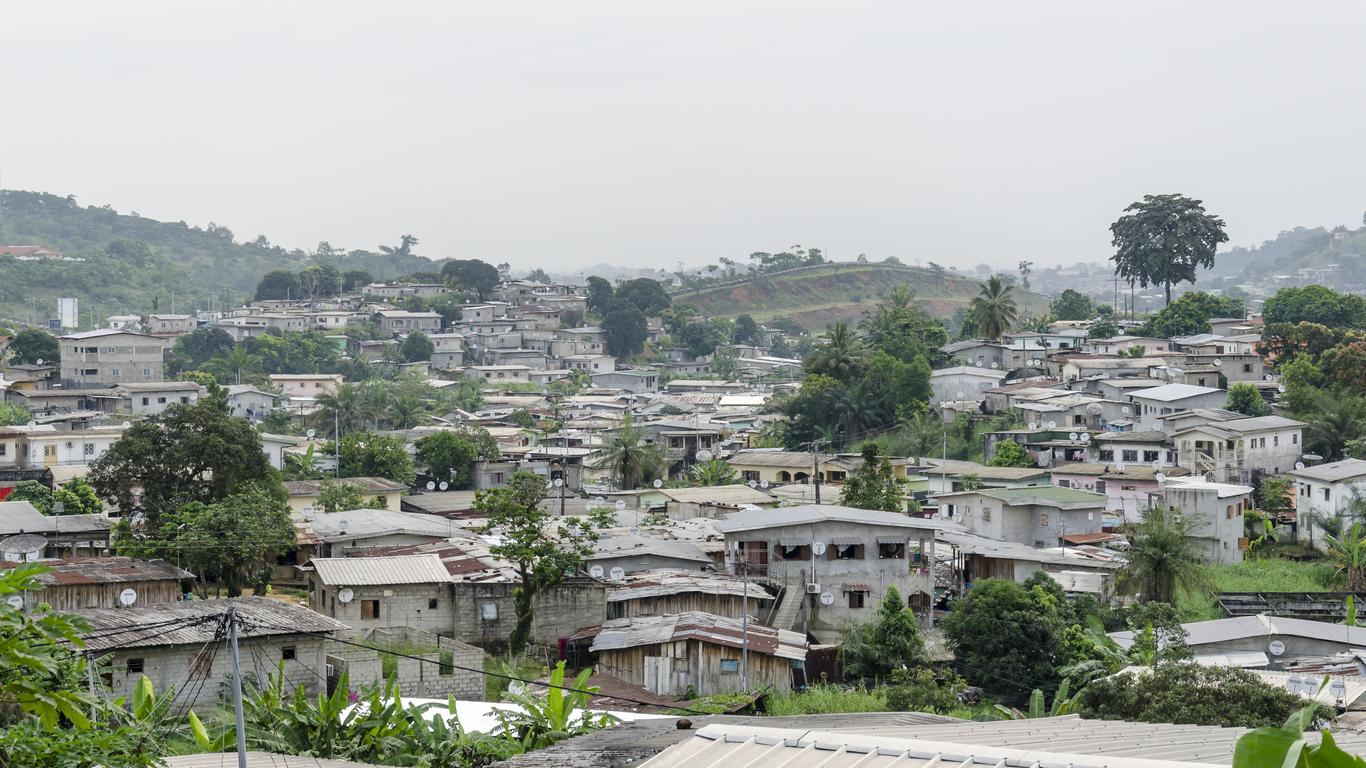
Gabon travel guide
Gabon tourism | gabon guide, you're going to love gabon.
Virtually unexplored, Gabon is a haven for nature lovers who want to discover abundant rainforests, savannahs, and diverse wildlife.
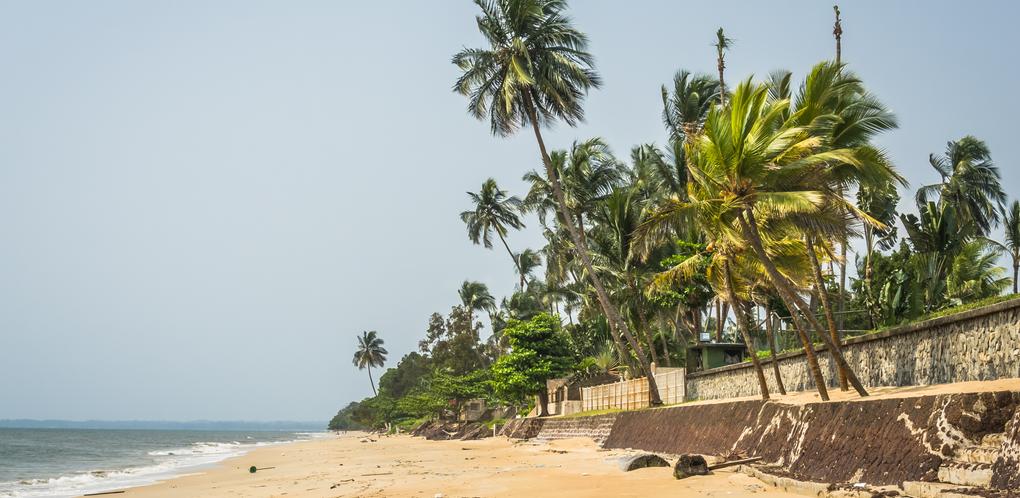
What to do in Gabon
1. observe gorillas in the wild.
At Loango National Park small groups of no more than four people head out to visit the resident gorillas. It's a once-in-a-lifetime experience that only takes place two times a week. The event itself takes close to 12h.
2. Take a Boat Trip on Lake Zilé
The trip may only take 1h, on average, but the experience is priceless. Hippos, crocodiles, and bats are just some of the wild animals that can be seen in the wild here.
3. Share a Beach with Elephants
Loango National Park is one of the top destinations for wildlife enthusiasts. One of the unique experiences is to share white sand beaches with elephants and hippos.
4. Explore Libreville
Gabon may be home to spectacular wildlife but its capital city, Libreville, is no less of a must-visit spot in the country. Museums, restaurants, casinos, and colorful markets are plenty to keep travelers busy for a few days before heading out to enjoy the outdoor adventures.
5. Take it All in at Pongara National Park
Pongara National Park is ideal for tourists who don't have a lot of time to explore Gabon. This National Park mixes all the natural beauties this country is known for: white sand beaches, savannahs, and dense forests. Travel here between November and February and see leatherback turtles come ashore to lay eggs.
When to visit Gabon
The ideal time to visit Gabon is between May and September, during the dry season. Not only is getting around the country easier at this time of year, but these are also the best months to spot wildlife.
How to Get to Gabon
Entry requirements.
Nationals from all countries need to apply for a visa before traveling to Gabon. In addition to the visa, passengers will also need a passport valid for at least six months and a return ticket.
Vaccination for yellow fever is mandatory and malaria prevention is advised.
International flights to Gabon land at the Libreville Leon M'ba International Airport, about 12 km (7.5 mi) from the city center.
Regular flights usually connect Gabon to Paris (France) and destinations in African countries. For passengers traveling from elsewhere, account for at least one layover.
Popular airports in Gabon
Popular airlines serving gabon, where to stay in gabon.
The types of accommodation in Gabon are usually hotels in the cities or lodges at national parks. Both tend to be expensive, so account for this part of traveling to make the most of your budget.
Where to stay in popular areas of Gabon
Most booked hotels in gabon, how to get around gabon, public transportation.
Public transportation in Gabon is a mix of taxis (shared or not), taxis-brousses, and minibuses known as "clandos" (short for clandestine).
Trains in Gabon are operated by SETRAG and run four times a week between Owendo (near Libreville) and Franceville.
Tickets range from approximately 41,800-63,800 XAF (70-107 USD) depending on class selected.
There are regular buses, operated by SOGATRA, connecting Libreville to other cities and main towns in Gabon. In large towns, buses depart from the central bus station.
Although most buses are older and have no air conditioning, they're still a more comfortable option than shared taxis and minibuses.
Most paved cities are within city limits, so when planning to explore the rest of Gabon by car, it's best to rent a 4x4 vehicle.
You'll need your local driver's license to rent a car. Alternatively, you can rent a car with a driver instead.
The Cost of Living in Gabon
High-end hotels accept payments with credit cards but elsewhere, cash is the primary form of payment. ATMs are scarce and most only accept Visa cards, so try to exchange currency before the trip and bring cash. A one-way ticket on public transportation costs approximately 200 XAF (0.35 USD). One day of groceries can cost around 7,800 XAF (13 USD).

12 reasons to visit Gabon (by a tourist turned local)
And now for something slightly different! This post comes courtesy of Luba Fateeva – a food and travel blogger at Orange Holiday. Luba spent nine years living in the Netherlands and now resides in Gabon, located on the west coast of central Africa. Not on your radar? I have to admit it wasn’t on mine either, but after Luba gave the lowdown (complete with some pretty inspiring photos), I might just have to add it to my list of places to visit. Here’s what she had to say…
Every time I go back home, my family and friends ask me the same question about Gabon over and over again. Why visit? If you’ve never considered travelling to Gabon, check out these 12 reasons to visit this stunning country, which might just change your mind:
1. Gabon is the last Eden on Earth
… or so they say, and I couldn’t agree more! Anyone considering a trip to Gabon can look forward to plenty of adventure in a naturally stunning and non-touristy environment.
Heavenly beaches of Gabon
2. Photographer’s paradise
Gabon has amazing and unspoilt nature with diverse wildlife. Witnessing and photographing animals in their natural habitat is one of the primary reasons to visit Gabon. It is THE place to be for bird watchers and anyone enamoured with nature. The best thing here is that you won’t have to stand in line to buy entrance tickets or push your way through a crowd of tourists to take a picture – those prestige white sand beaches, national parks and jungle roads are just for you!
3. Elephants galore
90% of Gabon’s landmass is equatorial rainforest, 10% of that has national park status and it’s home to 50% of Africa’s forest elephants. It is absolutely incredible to watch elephants in their natural environment – a must see for any visitor here.
The magic of elephants in their natural habitat
4. Turtle watching
Gabon hosts the world’s largest population of nesting leatherback turtles as well as the most significant nesting site for Olive Ridley turtles in the entire Atlantic Ocean basin. The season of turtles nesting and hatching is between October and March each year. This is the time when I am ready to receive a 6.00am or a midnight phone call from one of the local turtle watchers letting me know that the hatching or laying of eggs has began. That means I need to jump in the car as quickly as possible and drive to the beach (15-20 min away) to be on time to see the miracle take place. You simple cannot miss this opportunity to see it with your own eyes — it’s a real life experience of birth as they are released into the ocean, struggle to crawl, yet overcome all obstacles. It is very special and memorable moment.
Newborn turtle, too cute!!!
5. Game fishing
For those who love fishing Gabon is the place to be. It is a renowned destination, especially the Loango National Park, for catching big carnage, carp rouge, barracudas, bars and giant African threadfins. Enjoy a full day fishing in the beautiful waters of Ndogo and Iguela lagoons and reap the rewards with freshly caught fish for dinner. Nothing tastes better!
Catching your own dinner!
6. Night time crocodile tracking
This one is still on my list to do. It is a thrilling (but safe) activity suitable for all ages. With an experienced guide, the boat will cruise close to the edge of the mangroves and the lagoon. The guide will shine powerful lights onto the riverbanks, so watch out for the red eyes reflection – that’s a crocodile!
7. Jeep or boat safari
The best way to explore Gabon at a slow and enjoyable pace is by car and boat. Whilst cruising through savanas or rivers you can see exceptional abundance of wildlife such as elephants, hippos, buffalos, antelopes, monkeys and a number of birds like the hornbill and turaco.
Serious off-roading in Gabon
8. Visit a Bwiti village and witness some of their rituals
Consider yourself very lucky if you have ever had a chance to visit a local village in Gabon. Some places are still very traditional and due to their remoteness impossible to visit. But if you have a chance and a good guide with you, don’t miss this unique opportunity.
This is a full on action activity for true pioneers who want to trek and packraft across the Ivindo National Park and the Equator itself. You can explore two separate Gabonese river systems, the Djidji and the Kongou and packraft to Central Africa’s highest Djidji falls. On this journey be sure to see untouched paradise of thick jungle, white sand beaches and other-worldly landscapes.
10. Camping on the beach
Finding a good camping spot in Gabon is quite easy. You can set up your tent right on a beach or in the forest. Enjoying the sunset and the ocean view with a glass of wine is one of the most simple, yet amazing things in life.
Welcome to the good life
11. Bike rides
This is one of my personal favourites. I love my regular escapes on the quad along the beach or to the hills of beautiful Vera Plaines near Gamba village. This is always a breath of fresh air for me and provides a feeling of great freedom.
Thrill seeking in Gabon
12. Whale watching
Last, but not least on my list is whale watching – another very good reason to visit Gabon. From late June to mid-September the waters of Gabon are visited by migrating humpback whales, breeding off the coast of Gabon and then travelling back south to the cold waters of the Antartic where they feed. Going out on a boat with a skipper is a very special experience on its own. On top of that you will see these impressive, powerful mammals passing right by your boat. You might even be lucky to see them waving their tails at you!
Simply spectacular
Like what you see? Head over to Luba’s blog to see more inspiring stuff from Gabon and beyond.
- Latest Posts
Brit living in Amsterdam. Full-time content geek. Part-time explorer and blogger.
- Creatives around the world: a female-led theatre company
- Postcards from Toulouse
- The Transylvania Diary
Leave a Reply Cancel reply
Your email address will not be published. Required fields are marked *
More Stories

In search of schnitzel: places to eat in Vienna
Last month we jetted off to the Austrian capital for a three-day city break. Vienna, with its grand buildings at every turn and enviable…

Travel Guide Africa Gabon
Quick Facts
Contributors.

as well as hasbeen (4%), Peter (3%), Hien (3%), nigelpeaco (1%)
Gabon Travel Helpers

General info & GPS-waypoints. Good contacts. 4x4-tracks

I lived in southern Mexico for 3 years. I know how to get around. I know things to do. I know how to manage Mexico city.
Become a Travel Helper for Gabon
Accommodation in Gabon
Explore your accommodation options in Gabon
Community Activity
- 76 Blog Entries from Gabon
- 7 Gabon featured photos
This is version 34. Last edited at 8:11 on Oct 11, 23 by Utrecht . 23 articles link to this page.


IMAGES
VIDEO
COMMENTS
UTC+1. Gabon is a country in Western Central Africa. It lies on the Equator, on the Atlantic Ocean coast, between the Republic of the Congo to the south and east, Equatorial Guinea to the northwest and Cameroon to the north. A small population, as well as oil and mineral reserves have helped Gabon become one of Africa's wealthier countries.
Gabon is a country in Central Africa with an array of landscapes and wildlife in its 13 national parks.. A small population, and oil and mineral reserves, have helped Gabon become one of Africa's wealthier countries. The country has generally been able to maintain and conserve its pristine rain forest and rich biodiversity.
The best time to visit Gabon as a tourist is during the dry season, which generally occurs from June to September. This period experiences lower rainfall and more favorable weather conditions, making it ideal for wildlife viewing, outdoor activities, and exploring the diverse landscapes that Gabon has to offer.
Gabon (/ ɡ ə ˈ b ɒ n / gə-BON; French pronunciation: ⓘ; Sangu: Ngabu), officially the Gabonese Republic (French: République gabonaise), is a country on the Atlantic coast of Central Africa, on the equator, bordered by Equatorial Guinea to the northwest, Cameroon to the north, the Republic of the Congo on the east and south, and the Gulf of Guinea to the west.
Libreville is the largest city in and capital of Gabon. Get in . You can get to Libreville by plane with Turkish Airlines (direct flights from Istanbul), Lufthansa, Ethiopian Airlines, Air France, Virgin Nigeria (from Lagos via Douala), Gabon Airlines and Air Gabon International (the brand new -private- Air Gabon).
Gabon. This country has so many beautiful places waiting to be discovered by adventurers and nature-lovers. In fact, little-visited Gabon has everything to become Africa's next big ecotourism destination. Sean Connolly, author of Gabon: The Bradt Travel Guide. Famously dubbed 'Africa's last Eden' - and, even more enticingly, 'the ...
Africa. With an impressive 11.25% of the country proclaimed as national parkland, Gabon offers a spectacular array of wildlife in its dense rainforests and open savannah to enthrall nature enthusiasts. Add to that superb white-sand beaches, rushing rivers and ethereal landscapes, and you have an Eden-like travel experience in an unexplored part ...
Gabon is a beautiful Central African destination known for its lush national parks, which together account for around 10% of the country's total land mass. These parks protect a bounty of rare wildlife - including the elusive forest elephant and the critically endangered western lowland gorilla.Outside its parks, Gabon boasts pristine beaches and a reputation for political stability.
Local Advice. 1. The capital and largest city of Gabon is Libreville, located on the shores of the Como River and the Atlantic Ocean. 2. The currency used in Gabon is the Central African CFA (Communauté Financière Africaine) Franc, which is also used in some other parts of Africa, including Cameroon and Chad. 3.
Gabon is bordered by the Atlantic Ocean, Equatorial Guinea, Cameroon and the Congo. The 800km- (500-mile-) long sandy coastal strip is a series of palm-fringed bays, lagoons and estuaries. The lush tropical vegetation (which covers much of the interior) gives way in parts to the savannah.
When to go to Gabon. Gabon is a year-round destination. Climate-wise it is hot and humid all year. The dry season is May to September, while December and January tend to be a mini dry season with very little rain. The wet seasons are February to April and October/November. Roads can become impassable during this time, however the parks remain ...
Experience the richness of our biodiversity The Last Eden. Gabon was named by Condé Nast Traveler as one of "The 22 Best Places to Go", saying: « Adventure seekers, nature lovers, and environmental advocates who visit will find incredible biodiversity, and a country determined to put critical conservation and eco-tourism projects in place before the masses arrive.
Gabon Gabon, officially known as the Gabonese Republic, is a country located on the west coast of Central Africa. With its vibrant culture, diverse wildlife, and stunning natural landscapes, Gabon is a hidden gem waiting to be explored. In this article, we will delve into the rich history, breathtaking attractions, and unique features that make
Gabon is bordered by the Atlantic Ocean, Equatorial Guinea, Cameroon and the Congo. The 800km- (500-mile-) long sandy coastal strip is a series of palm-fringed bays, lagoons and estuaries. The lush tropical vegetation (which covers much of the interior) gives way in parts to the savannah.
Lonely Planet - Gabon - A reliable travel guide that covers essential travel information, places to visit, accommodations, and reviews for Gabon. Bradt Travel Guides - Gabon - Comprehensive travel guide with detailed insights and recommendations on Gabon's attractions, both mainstream and off-the-beaten-path.
Central Africa holiday, Cameroon and Gabon. A pioneering journey through the heart of Central Africa. From £6899 13 days ex flights. See all our Gabon Holidays Give us a call. Written by Vicki Brown. Gabon travel guide. Read our 2 minute summary on Gabon with map and highlights to help you make the most of you time in Gabon.
Gabon, officially the Gabonese Republic, is a country on the Atlantic coast of Central Africa, on the equator, bordered by Equatorial Guinea to the northwest, Cameroon to the north, the Republic of the Congo on the east and south, and the Gulf of Guinea to the west. It has an area of 270,000 square kilometres (100,000 sq mi) and a population of 2.3 million people.
Known for its pristine rainforests, diverse wildlife, and picturesque beaches, Gabon is a true gem waiting to be explored. This comprehensive travel guide will help you plan your trip to this extraordinary destination. Getting to Gabon. To reach Gabon, you can fly into Libreville International Airport, which is the main entry point for ...
Survivor: Gabon—Authentic African Drama in High Def. Read. National Geographic's latest travel stories about Gabon.
2. Take a Boat Trip on Lake Zilé. The trip may only take 1h, on average, but the experience is priceless. Hippos, crocodiles, and bats are just some of the wild animals that can be seen in the wild here. 3. Share a Beach with Elephants. Loango National Park is one of the top destinations for wildlife enthusiasts.
Set foot in Gabon, an equatorial African gem where the rhythm of Bwiti music, the biodiversity of Loango National Park, and the vibrant life of Libreville converge. Encounter diverse wildlife on a safari through Loango, immerse yourself in the bustling atmosphere of Libreville's markets, or witness the ancient traditions of the Bwiti.
Gabon hosts the world's largest population of nesting leatherback turtles as well as the most significant nesting site for Olive Ridley turtles in the entire Atlantic Ocean basin. The season of turtles nesting and hatching is between October and March each year. This is the time when I am ready to receive a 6.00am or a midnight phone call ...
Geography. Gabon is located in the southern part of West Africa, along the shores of the Atlantic Ocean and is bordered by the Republic of Congo to the east, Equatorial Guinea to the northwest and Cameroon to the central north. Much of the land in Gabon is tropical rainforest, totalling almost 85% of the country.